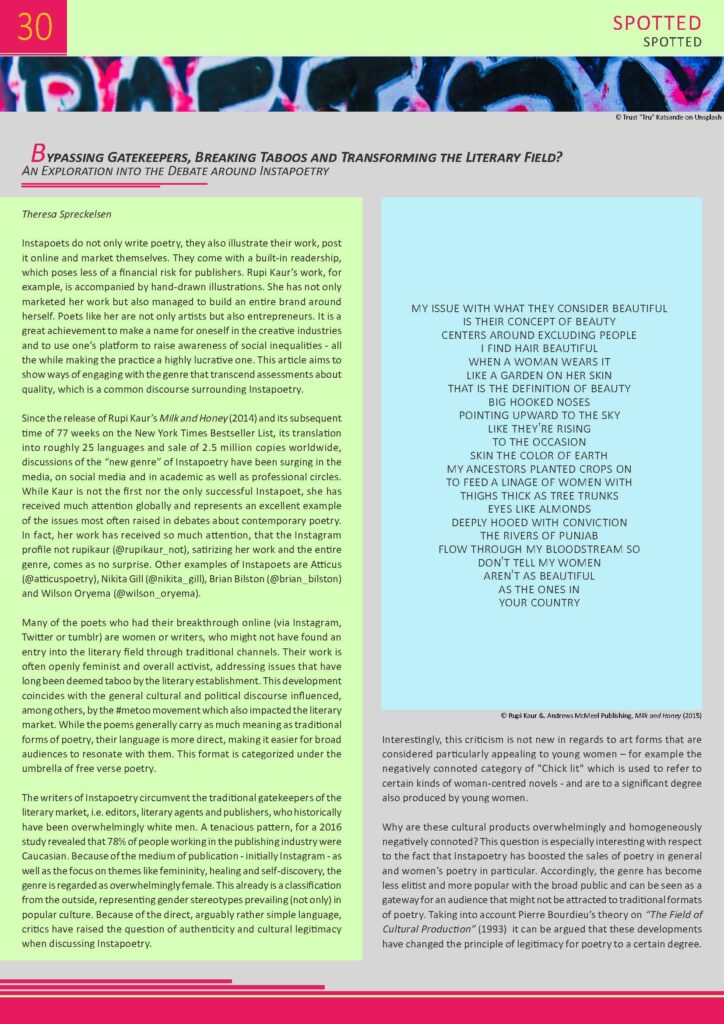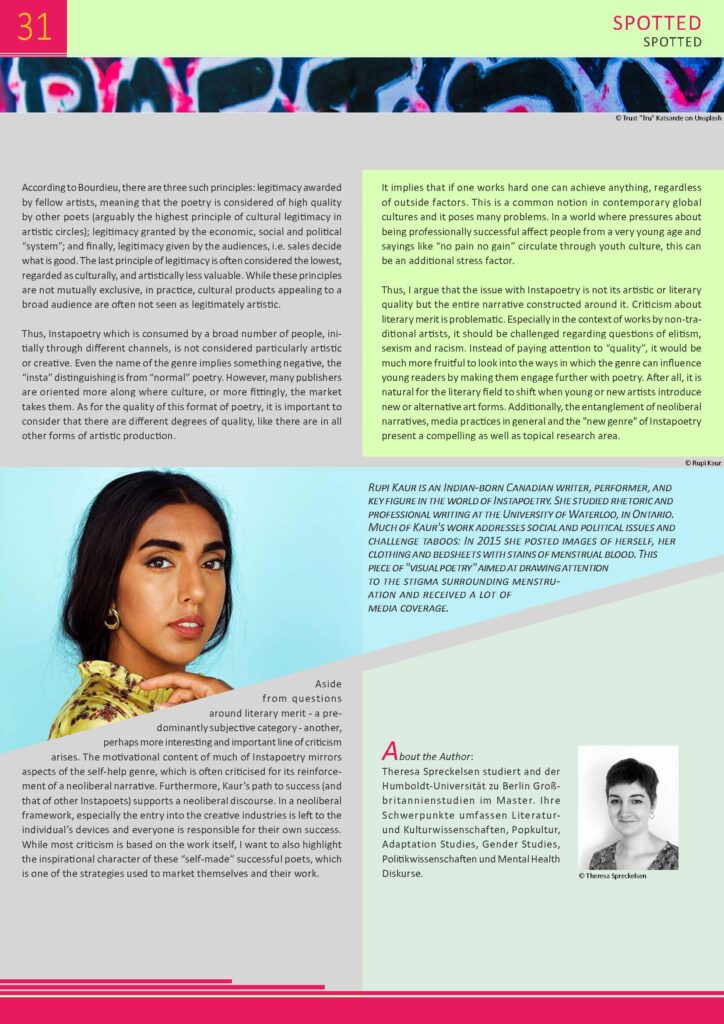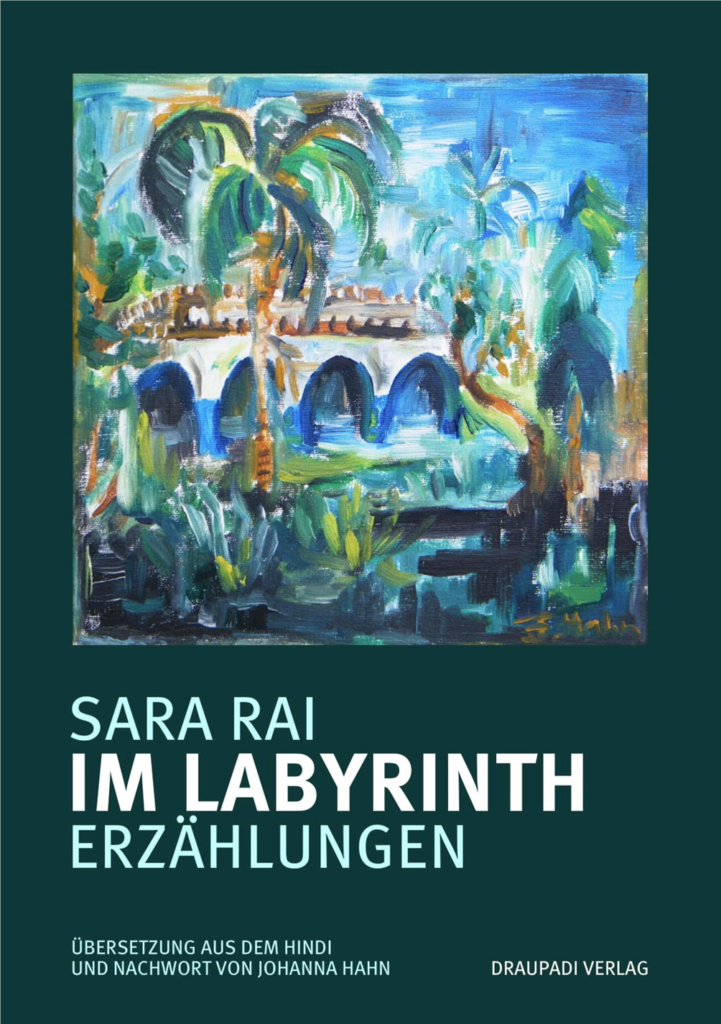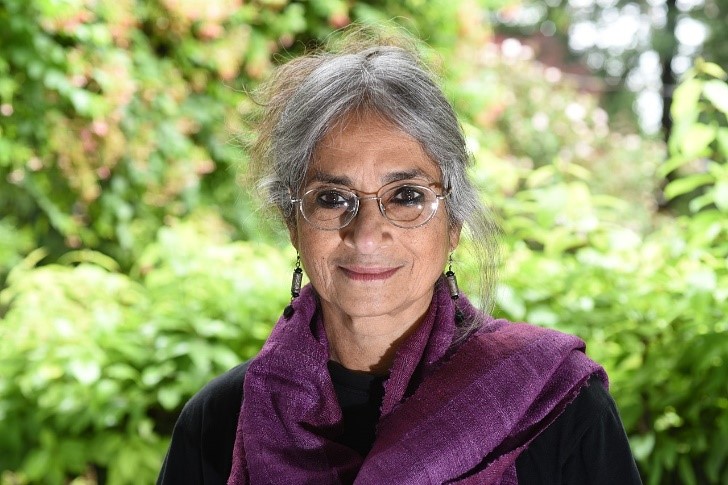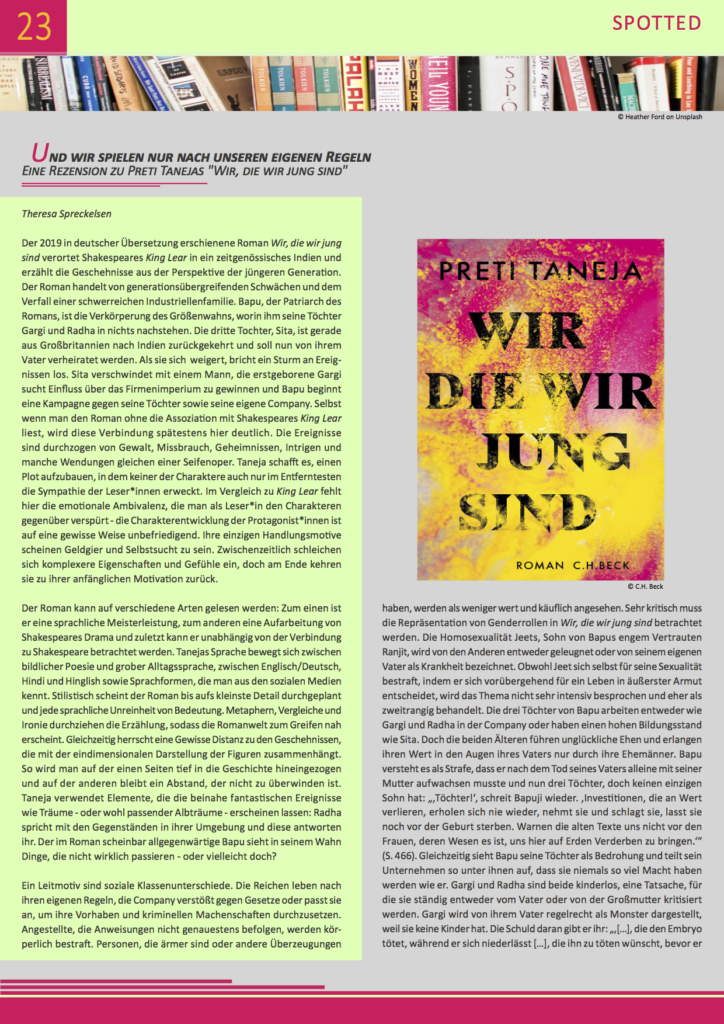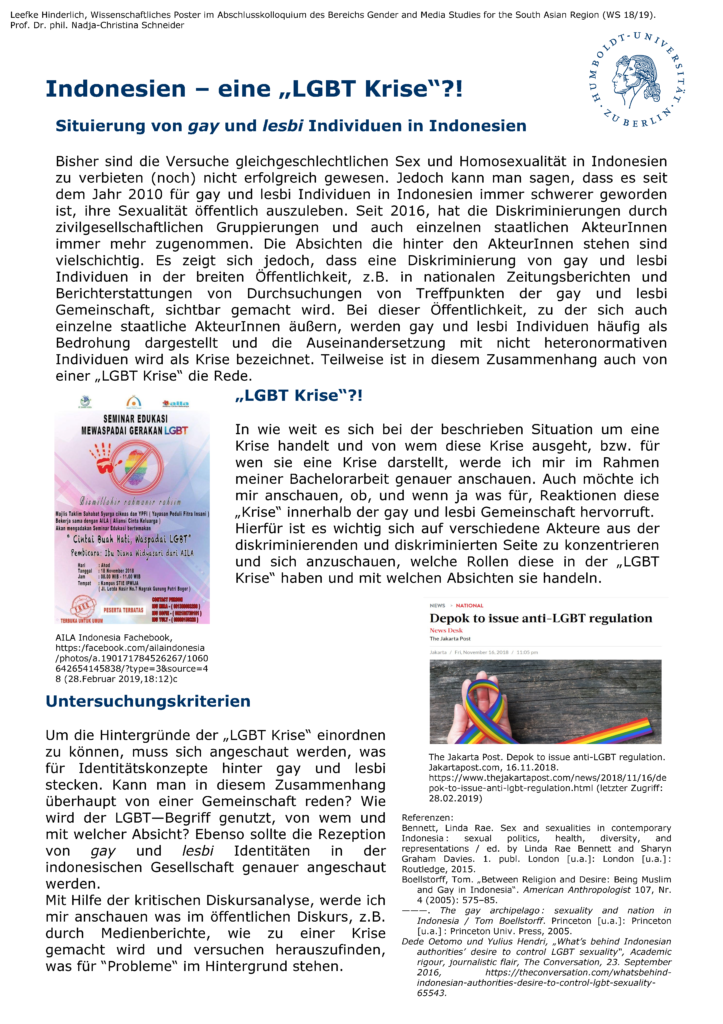Die folgenden Poster zu Forschungsprojekten von Studierenden sind im Rahmen des Forschungsseminars „‚Migrantisch‘, ‚diasporisch‘ oder ‚global‘? Südasiatische Medienkulturen in Berlin“ von Frau Prof. Dr. Schneider entstanden (Wintersemester 2019/20).
Zusammengehörigkeit in ‚der‘ deutsch-vietnamesischen Community in Berlin: Eine Annäherung an den Community-Begriff durch den Podcast Rice and Shine
Duc Ha Nguyen
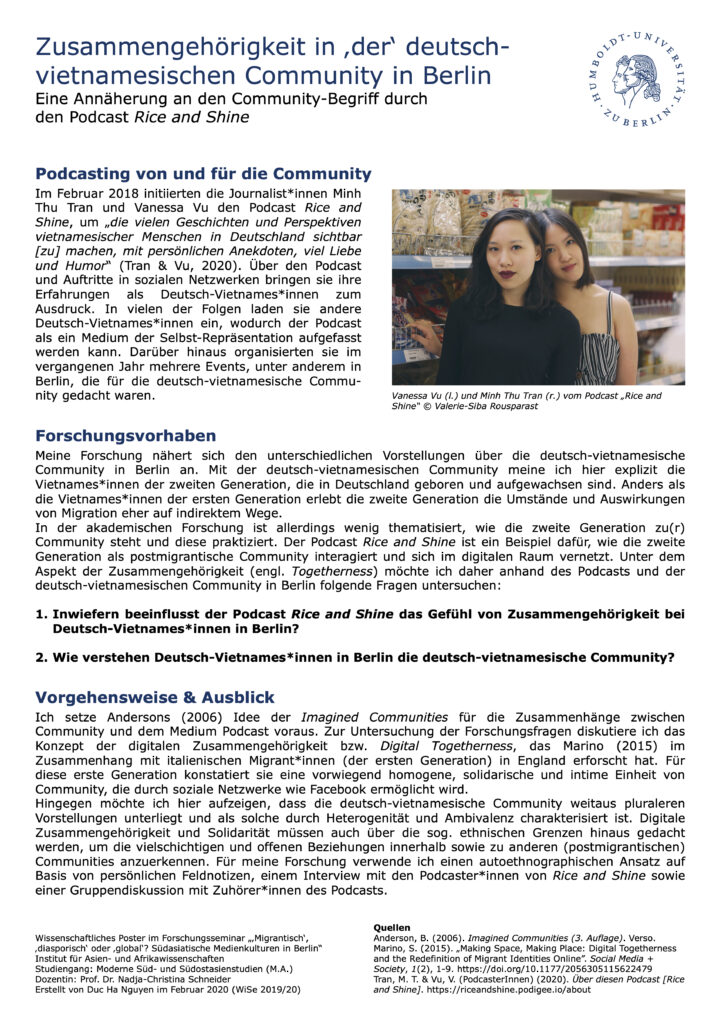
„Multilingualität“ – „Anderssein“ oder „Zusätzlich sein“? Mehrsprachigkeit als Ressourse und Erweiterung eigener Mobilität
Olena Jähne
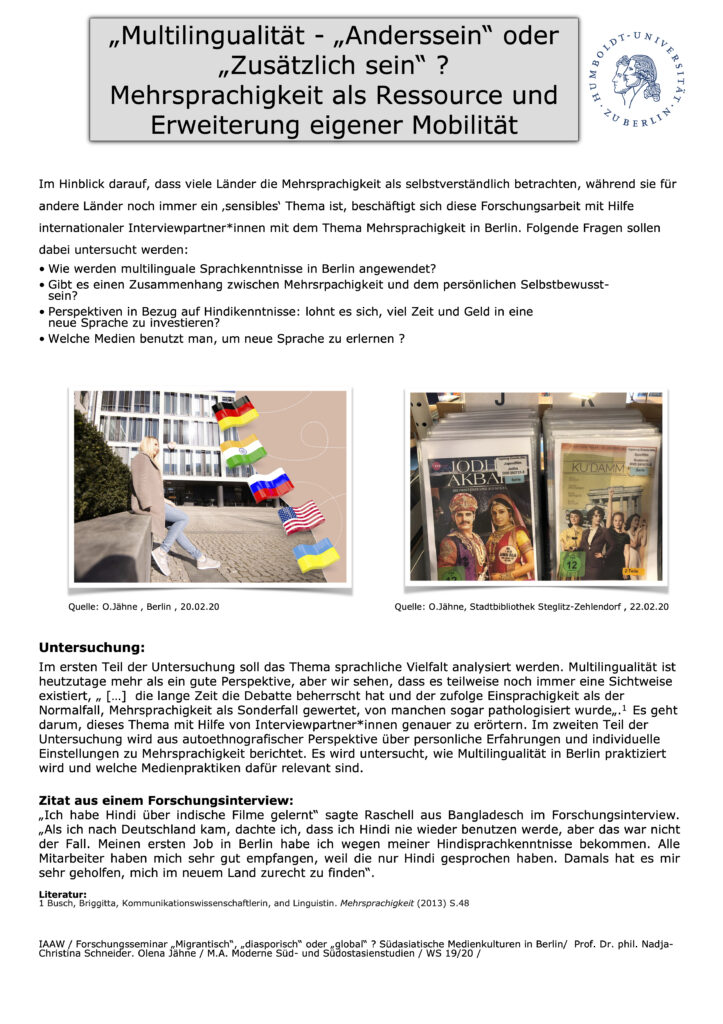
Erfahrungsprozesse und identitätsbezogene Aushandlungsprozesse von tamilischen Jugendlichen in Berlin
Janani Iyer
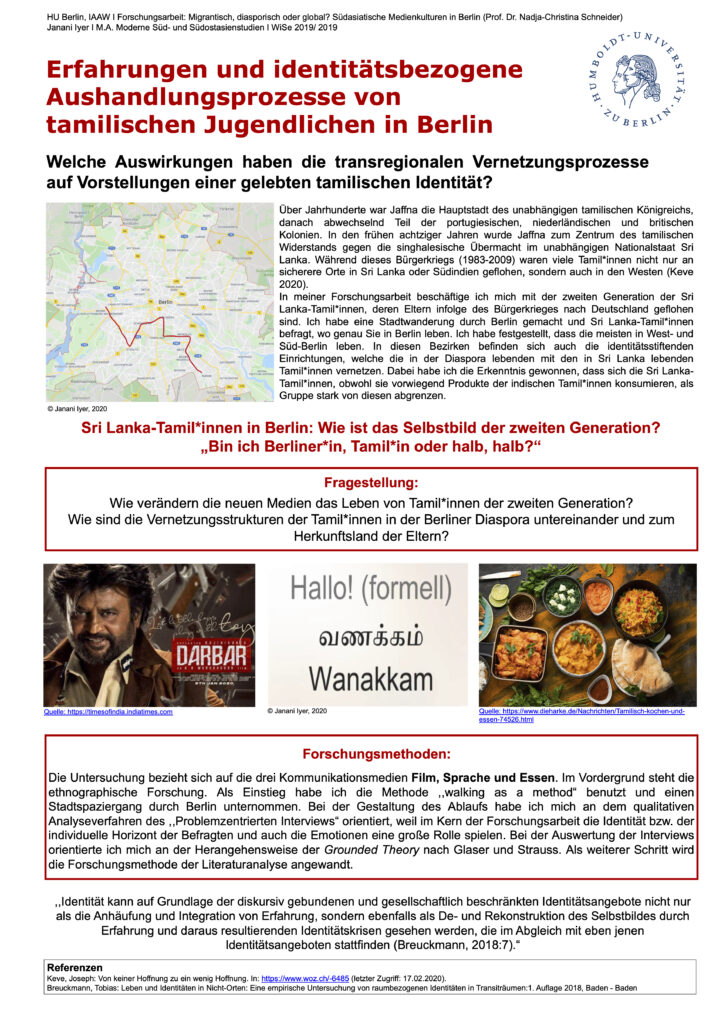
Stiftung in der Praxis – Herstellung medialer Sichtbarkeit für südasiatische Migrant*innen?
Désirée Viktoria Mohn
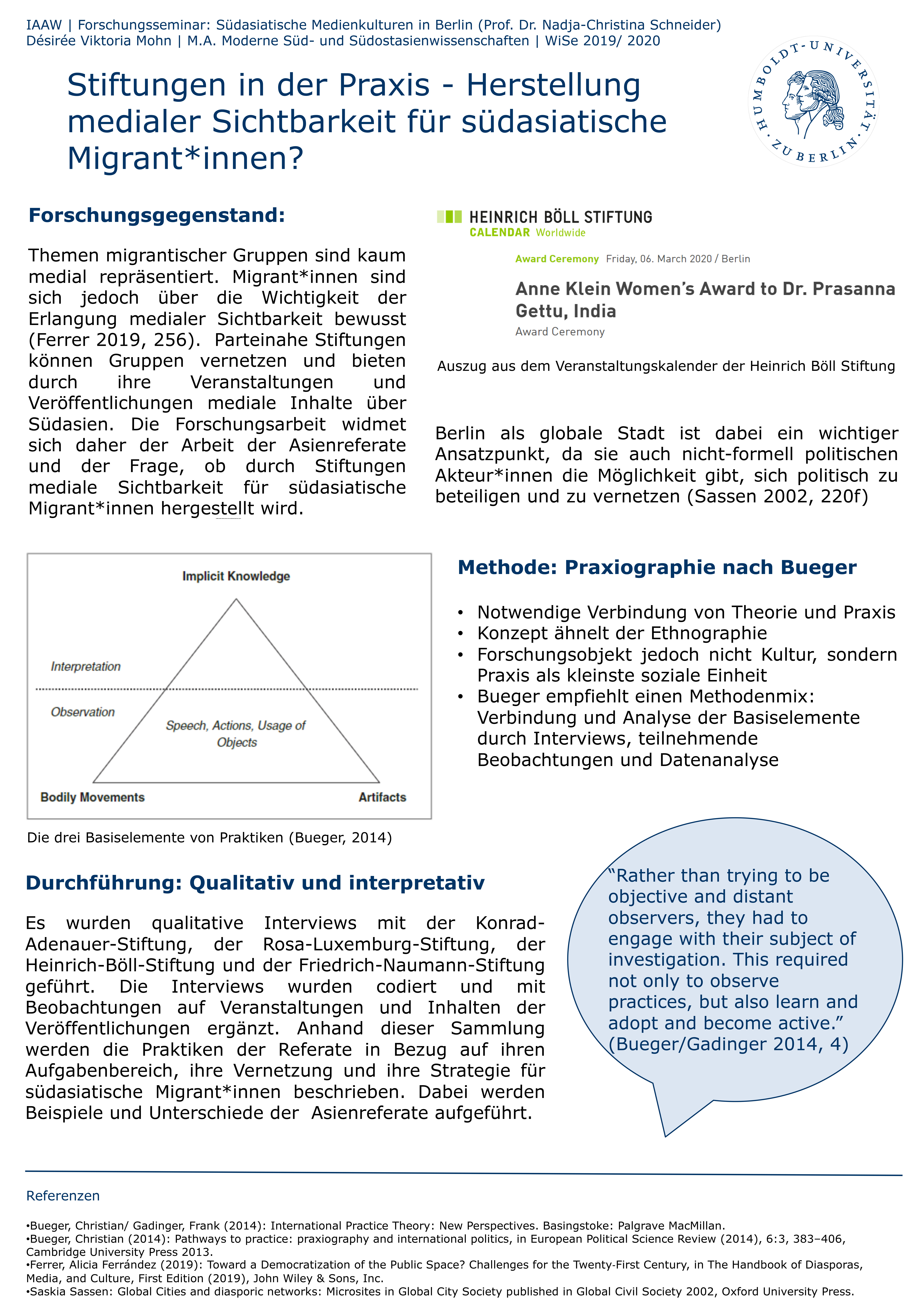
von Alexa Altmann
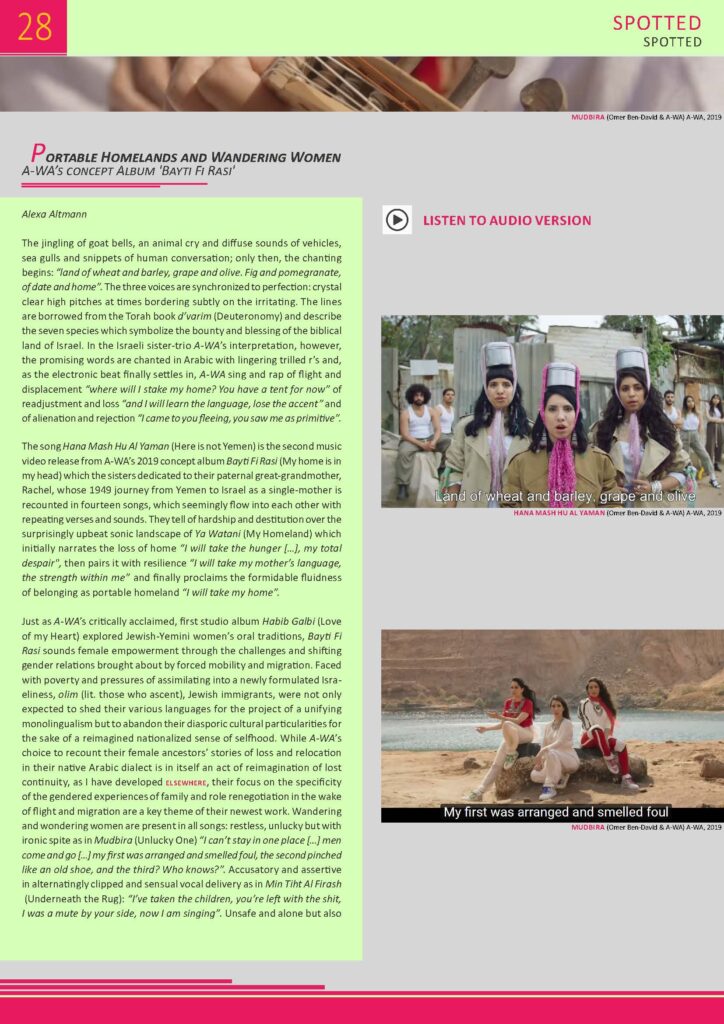
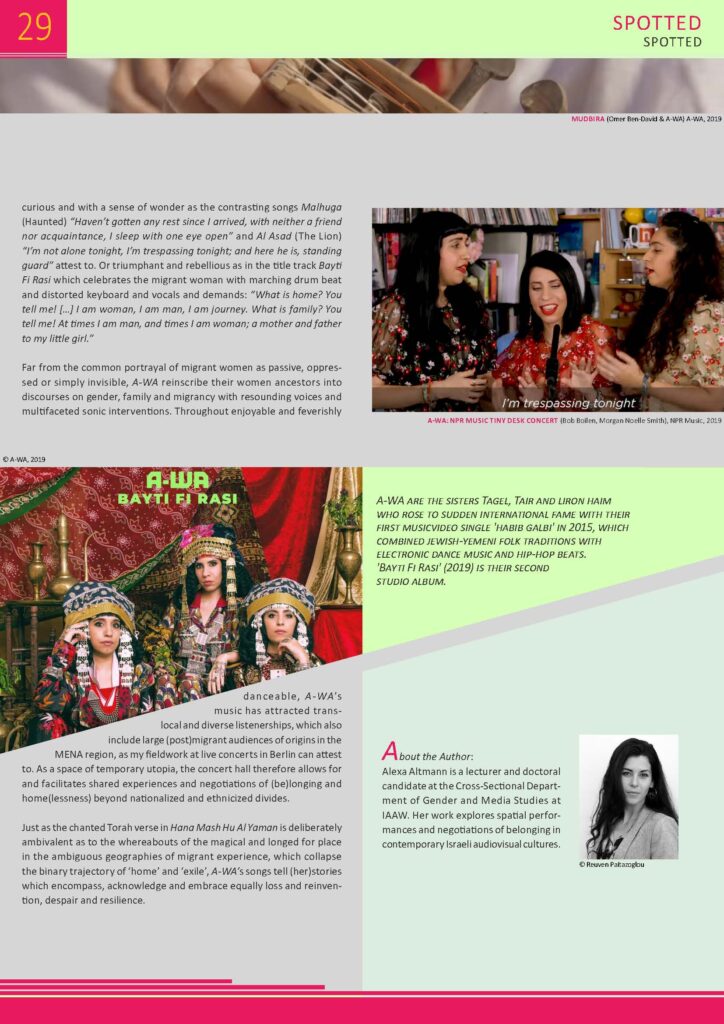
By Elena Schaetz
In 2019 I traveled to South Africa to contribute to the work of the queer NGO Gay and Lesbian Network (GLN) in Pietermaritzburg, KwaZulu-Natal. GLN is focused on queer activism in the rural areas around Pietermaritzburg where they conduct workshops to educate and empower the community on topics such as sexuality and gender. As an organization from the community for the community, they built a place of support and connection for queer people. GLN aims to strengthen a network of LGBTI organizations, activists and allies in the province by bringing people together to share their knowledge.
Media plays a major role when it comes to their activism. GLN’s team gives queer South Africans the opportunity to learn skills like producing podcasts and creative writing to help them find their voice.
While I spent two months working at GLN’s social media team, they introduced me to Prof. Sir Zanele Muholi’s work and told me great stories about the impact Muholi has on the queer community as a visual artist and activist.
One of my colleagues took part in one of Muholi’s photography workshops and has been supported by them since then. He grew up as a trans boy in a township nearby and described to me how art has helped him figuring out his identity and how important it is to express that identity.
I have always valued art for the variety of emotions and stories it conveys and I deeply believe in the importance of representation. Muholi’s photographs show marginalized people in beautiful portraits, embracing their identities in a graceful and empowered way.
Like GLN, Muholi aims to connect and empower queer South Africans. They created the blog Inkanyiso (Zulu for „to light“) in 2006 as a platform for information and inspiration regarding queer rights, queer visual art and black queerness in South Africa.
Three years later Muholi registered Inkanyiso as a non profit organization, in response to the lack of visual histories and skills training produced by and for the LGBTI community. Since then, a collective of artists, writers and activists have been involved in Inkanyiso.
Their goal is to inform the reader on the struggles of marginalized groups by telling personal stories or showing different art pieces in forms of poetry, photography and videos. Inkanyiso also provides information on the political situation in South Africa and how current events affect the local LGBTI community.
South Africa has a very liberal and queer friendly constitution – same-sex marriage has been legalized in 2006, which makes it the fifth country worldwide giving queer people the right to legally get married. But the legal situation does not necessarily reflect the everyday life. Hate crimes like „corrective rapes“ – the rape of queer people with the intention to „turn“ them heterosexual, are still happening on a daily basis, forcing the LGBTI to take action like Muholi did with Inkanyiso.
Inkanyiso tackles issues regarding race, sexuality and gender, including black trans, lesbian and gay struggles in different parts of South Africa. The posts show the complexity and fluidity of gender and sexuality and give insight on personal problems as well as on structural, political issues. But Inkanyiso is not only a source for information, it’s also a place for empowerment. The writers show how art can shape the world, how they learned various skills and how they now use these skills to make a difference.
Muholi’s latest work – the workshops or speeches they give and their art works as well, is also partly presented on Inkanyiso.
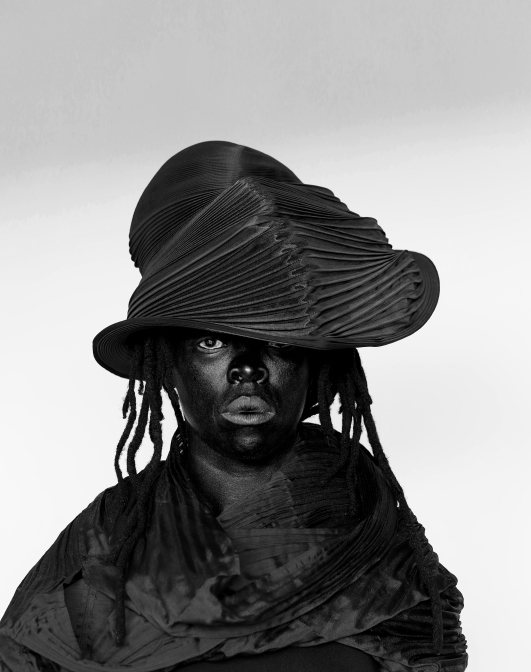
„Somnyama Ngonyama, Hail the Dark Lioness” is a series of self portraits which Muholi started in 2012. The ongoing project now contains 365 pieces that show Muholi’s alter egos, mostly coming from a Zulu background, expressing Muholi’s identity as a black nonbinary queer South African.
Their project Faces and Phases, started in 2006, continues the theme of black queer identity but puts it in a wider perspective since it features a huge variety of black queer people instead of focusing on one individual. The 13th anniversary of this project lead to their latest solo photography exhibition Faces and Phases 13 which took place at STEVENSON in Johannesburg in 2019. With more than 500 black and white portraits of lesbians, gender-nonconforming individuals and transmen, the series Faces and Phases shows different aspects of gender and sexuality in black spaces. It focuses on black lesbian identities in townships and politics in post-apartheid South Africa. During Muholi’s travels they also documented black lesbian and trans people outside of their home country.

From the series Somnyama Ngonyama, Hail the Dark Lioness by Zanele Muholi
Copyright 2020 STEVENSON
About the artist: Zanele Muholi was born in 1972 in Durban, South Africa. After attending an Advanced Photography course at the Market Photo Workshop in Johannesburg in 2003, they held their first solo exhibition at the Johannesburg Art Gallery one year later. They finished university with a Master of Fine Arts degree in Documentary Media from Ryerson University in Toronto. In 2014 they taught visual activism at Hochschule für Künste in Bremen, Germany. Since then, they worked as a visual artist and queer activist, raising awareness on queer rights and focusing on increasing the visibility of black lesbian, gay, transgender, and intersex people.
Update 05 January 2022:
Since November 26, 2021, Muholi’s first comprehensive solo exhibition in Germany is being shown at Gropius Bau, Berlin. The exhibition which includes both lesser-known, early image series and recent works of the South African artist, can be visited until March 13, 2022.
Curated by Natasha Ginwala, Associate Curator, Gropius Bau; Yasufumi Nakamori, Senior Curator International Art (Photography), Tate Modern; and Sarah Allen, formerly Assistant Curator, Tate Modern.
Wed till Mon 10:00-19:00
Tue closed
More information about the exhibition can be found here: www.berlinerfestspiele.de.
About the author: Elena Schaetz is currently enrolled in the Master’s program Afrikawissenschaften at Humboldt-University, Berlin. Her work focuses on literature, culture, gender and queerness in South African regions.
Theresa Spreckelsen
Der 2019 im Heidelberger Draupadi-Verlag erschienene Band Im Labyrinth enthält eine Auswahl an Erzählungen der indischen Autorin Sara Rai. Aus dem Hindi übersetzt wurden sie von der Südasienwissenschaftlerin Johanna Hahn. Neben ihrer Arbeit als Autorin ist Sara Rai als Übersetzerin und Herausgeberin tätig. Ihre Werke verfasst sie überwiegend auf Hindi. Rais erster Erzählband „Schwalbenflug“ wurde 1997 veröffentlicht, gefolgt von „In der Wildnis“ (2005) und dem Roman „Das Milanenhaus“ (2010). Ihr Großvater ist als Schriftsteller unter dem Pseudonym Premchand bekannt und gilt als Wegbereiter der modernen Hindi-Literatur. Ihr Vater, Shripat Rai, war ein bedeutender Herausgeber und Literaturkritiker und auch ihre Mutter, Zahra Rai, verfasste Kurzgeschichten.
In den Erzählungen dieses Bandes trifft der_die Leser*in auf eine Vielzahl diverser und interessanter Charaktere. Sei es die Geschichte eines abergläubischen siebenjährigen Mädchens in „Schwalbenflug“ oder eines alten kranken Mannes in „Babu Devidins neue Welt“ – die Ereignisse haben eine Gemeinsamkeit: sie beschreiben mit viel Liebe zum Detail alltägliche wie auch besondere Erfahrungen. Ein älteres Ehepaar, das an den Ort seiner Flitterwochen zurückkehrt und durch die Begegnung mit einem frisch verheirateten Paar wieder zueinander findet. Alte Freunde, die sich auseinandergelebt haben und ihre Freundschaft trotz aller Bemühungen nicht mehr retten können, dies vielleicht auch gar nicht möchten. Eine Amarvallari-Pflanze, die gegen den ständigen, durch die Globalisierung angetriebene Fortschritt ankämpft und zeigt, wie sich die Natur zurückholt, was die Menschen ihr genommen haben – denn, „Unkraut vergeht nicht.“ Eine von Schlaflosigkeit geplagte Frau, die während einer im Fernsehen übertragenen Rede des Premierministers endlich einschläft. All diese Figuren spiegeln die Komplexität der sozialen und kulturellen Situation im heutigen Indien wider.
Die Erzählung „An der Kante“ handelt von einer Beziehung zwischen zwei Männern, die nicht nur unterschiedliche soziale Klassen, Kasten und Religionsgemeinschaften sondern auch einen beachtlichen Altersunterschied überwinden müssen. Manoranjan erzählt von seinem ewigen Dasein in einem gesellschaftlichen Gefängnis, weil er nicht der sein kann, der er wirklich ist: er liebt Männer und wäre selbst lieber eine Frau. Sein Freund Javed ist in die Stadt gezogen, um seine Familie zu unterstützen und muss nun auf Grund eines unerklärten Verdachts zurück in seine Heimat fliehen. Als er nach neun Monaten zurückkehrt, hat er den Wünschen seiner Familie nachgegeben und festgestellt, dass das Gefängnis, dem er entkommen zu sein glaubte, ihn immer wieder einholt.
Ein starker Kontrast zu dieser Geschichte ist „Tatverdächtiger flüchtig“ – eine Erzählung, die sich mit dem „Shakti Mills Gang Rape“[i] befasst, einem Vergewaltigungsfall, der 2013 große Aufmerksamkeit in den indischen Medien erhielt. Diese Geschichte wird aus der Perspektive eines daran beteiligten Täters erzählt und ist eine interessante Leseerfahrung. Auch er kehrt auf der Flucht vor der Polizei in seine Heimatstadt Allahabad zu seiner ebenfalls gewalttätigen Mutter zurück. Nach einer ziemlich drastischen Schilderung des Verbrechens konzentriert sich die Erzählung auf die Zeit, in der der flüchtige Täter in seinem Versteck ausharrt, bis sich die Aufregung um den Fall gelegt hat. Es wird deutlich, dass Handlungen Konsequenzen haben, auch wenn sie nicht so ausfallen wie zunächst erwartet.
So unterschiedlich wie die Inhalte der Erzählungen sind auch die Sprachstile und Register, die Sara Rai verwendet. Dies reflektiert zum einen die sprachliche und kulturelle Vielfalt Indiens, zum anderen aber auch die Biografie der Autorin selbst. Sie verwendet verschiedene Sprachen, Dialekte, Stile und schafft es dabei, die fiktive Welt vor den Augen der Leser*innen entstehen zu lassen. Stilistisch ist die Sammlung eine absolute Wohltat, es macht einfach nur Freude, in diese Geschichten einzutauchen. Auch wenn sie zum Teil dunklere Themen behandeln, wirkt die Atmosphäre der geschilderten Situation nie düster. Denn auch an schwierigen Stellen setzt die Autorin mit viel Feingefühl auf Humor und es gelingt ihr, die Stimmung nicht zu bedrückend werden zu lassen. In „Tatverdächtiger flüchtig“ wirkt beispielsweise die Mischung aus Dialekt, Slang und fehlerhaften Sätzen passend für die emotionale Situation des Protagonisten. Zugleich macht sie die Erzählung leichter, ohne dabei das politisch relevante Thema zu verharmlosen.
Der vielleicht bedeutendste Beitrag ist der autobiografische Essay „Du wirst die Katherine Mansfield der Hindi-Literatur sein“, in dem Rai ihre eigene Entwicklung als Schriftstellerin mit sprachlich-linguistischen, sozialen und kulturellen Herausforderungen reflektiert. So beschreibt sie die Schwierigkeit, die richtige Sprache für ihre Geschichten zu finden – in ihrem Elternhaus wurde Hindustani gesprochen, eine Mischung aus Hindi und Urdu, in der Schule wiederum Englisch und ihr Vater war Herausgeber hindisprachiger Werke. Rai erklärt, dass sie sich „nicht nur in Bezug auf Sprache wie ein Migrant [sic]“ fühlte. Durch die Art, wie sie über das Schreiben schreibt, werden Situationen und Prozesse beschrieben, in denen sich jede*r Literaturliebhaber*in wiederfindet. Gleichzeitig hat der Essay eine große politische Bedeutung, denn er erläutert die Komplexität der Aufgabe, ein Land wie Indien, das oft auf stereotypische Aspekte reduziert wird, in der Kunst und Literatur zu repräsentieren: die Verwendung verschiedener Sprachregister, die Namen der Personen und beschriebene Kleidungsstücke geben Indien kundigen Leser*innen Auskunft über die Kaste, Klasse und regionale Herkunft der Charaktere. Für das unwissende Publikum gibt es ein detailliertes Glossar, ergänzend zu den Erklärungen in den Fußnoten. So werden die Erzählungen für ein breitgefächertes Publikum zugänglich.
Nicht zuletzt ist die Qualität der Übersetzung dieser Erzählungen hervorzuheben. Die Herausforderungen, vor denen sich Rai sah, als sie sich letztendlich dazu entschied, in mehreren Sprachen zu schreiben, stellten sich auch der Übersetzerin. Johanna Hahn musste zusätzlich zu der Schwierigkeit, die bildliche und stilistische Sprache des Originals effektiv wiederzugeben, verschiedene Sprachen in eine einzige – das Deutsche – übersetzen, was ihr hervorragend gelungen ist. Die Geschichten wirken lebendig und direkt, nie trocken oder langweilig. Auch der Klang, der für die Autorin im Hindi von großer Bedeutung ist, geht im Deutschen nicht vollkommen verloren.
Die Geschichten in Im Labyrinth reflektieren eine Vielzahl von unterschiedlichen Themen, allesamt politisch, sozialkritisch und relevant. Mal sind sie humorvoll, ein anderes Mal melancholisch. Rais Charaktere sind angenehm menschlich, ihre Gefühle und Gedanken realistisch, sodass die Leser*innen sich ihnen ganz nah fühlen. Trotz der Vielfalt an Themen und Personen sind die Erzählungen in diesem Band so ausgewählt und angeordnet, dass sie eine Einheit bilden. Mit dem Coburger Rückert-Preis 2019 ausgezeichnet, hat dieses Werk es geschafft, eine relevante und herausragende Stimme der indischen Literatur im deutschen Buchmarkt zu festigen.
[i] Bei dem „Shakti Mills Gang Rape“ handelt es sich um ein Vergewaltigungsverbrechen, welches 2013 in Indien sehr viel in den Medien diskutiert wurde. Eine junge Journalistin wurde auf dem Gelände der Shakti Mills in Mumbai von fünf Tätern vergewaltigt. Drei von ihnen wurden verurteilt, zwei waren minderjährig.
Zur Autorin:
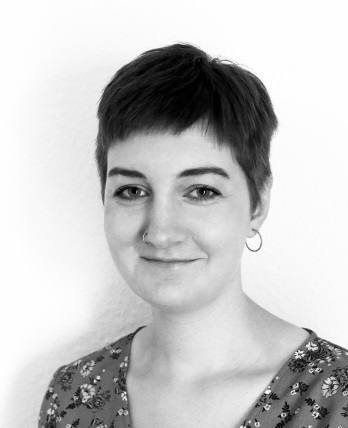
Theresa Spreckelsen studiert an der Humboldt-Universität zu Berlin Großbritannienstudien im Master und arbeitet als studentische Mitarbeiterin am Bereich Gender and Media Studies for the South Asian Region. Ihre Schwerpunkte umfassen Literatur- und Kulturwissenschaften, Popkultur, Adaptation Studies, Gender Studies, Politikwissenschaften und Mental Health Diskurse.
Die folgenden Poster zu geplanten Master- und Bachelorarbeiten der Teilnehmenden sind im Rahmen des Abschlusscolloquiums von Frau Prof. Dr. Schneider im Wintersemester 2018/19 entstanden. Einige Poster hängen aktuell auch in der 2. Etage des IAAW (Invalidenstraße 118) aus.
Doing Elderly Care in Multilocal Families: How do forms of mediated elderly care shape ways of doing family in Nepalese multilocal families in the 21st century?
Lisa Neubert-Tamrakar
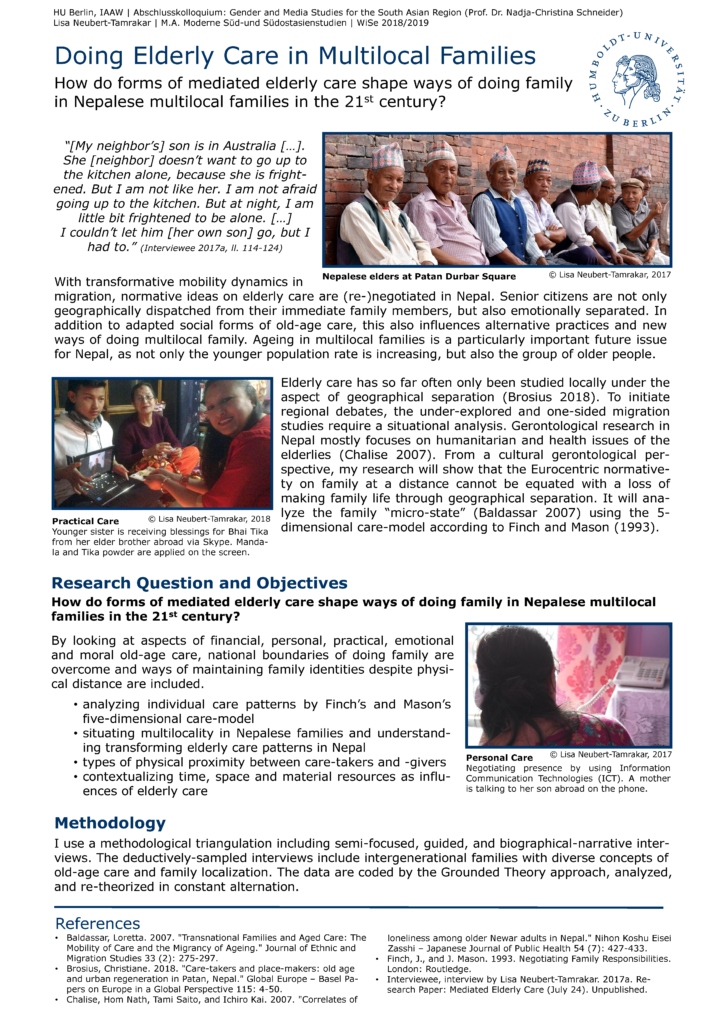
Indonesien – eine LGBT-Krise?
Situierung von gay und lesbi Individuen in Indonesien
Leefke Hinderlich
Der Mythos vom Digitalen Indien: Die Vision eines neuen Indiens in Zeiten der Digitalisierung
Erik Becker
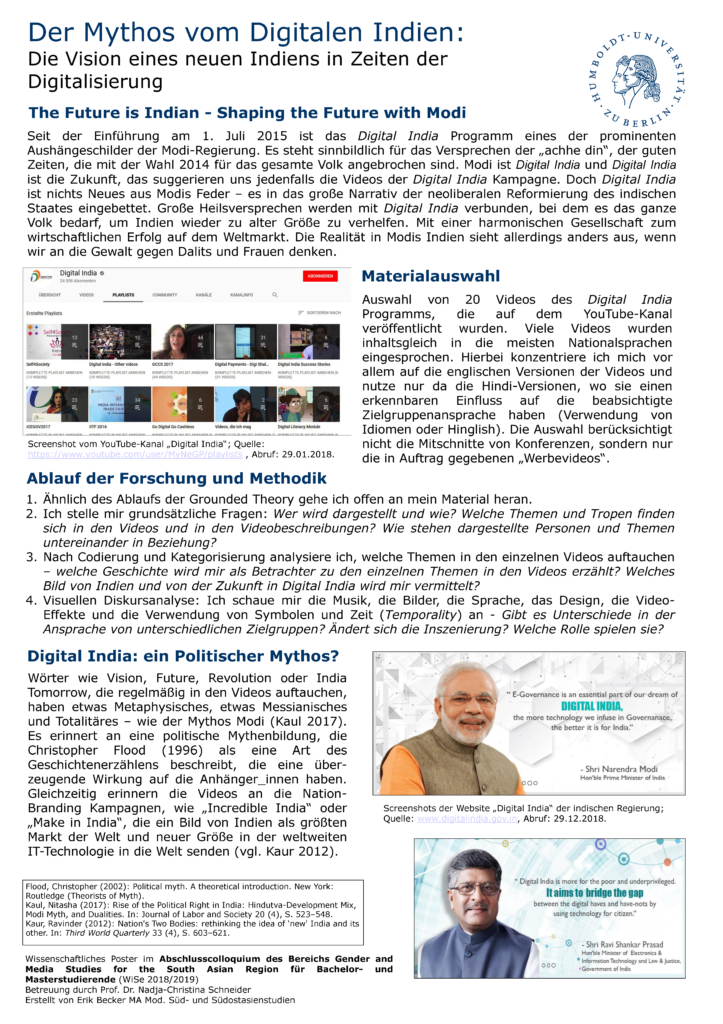
„Ab sirf Imran Khan“: Medienanalyse anhand nationaler und internationaler Berichterstattung zum Wahlausgang der PTI in den Wahlen 2018 in Pakistan
Humda Qamar
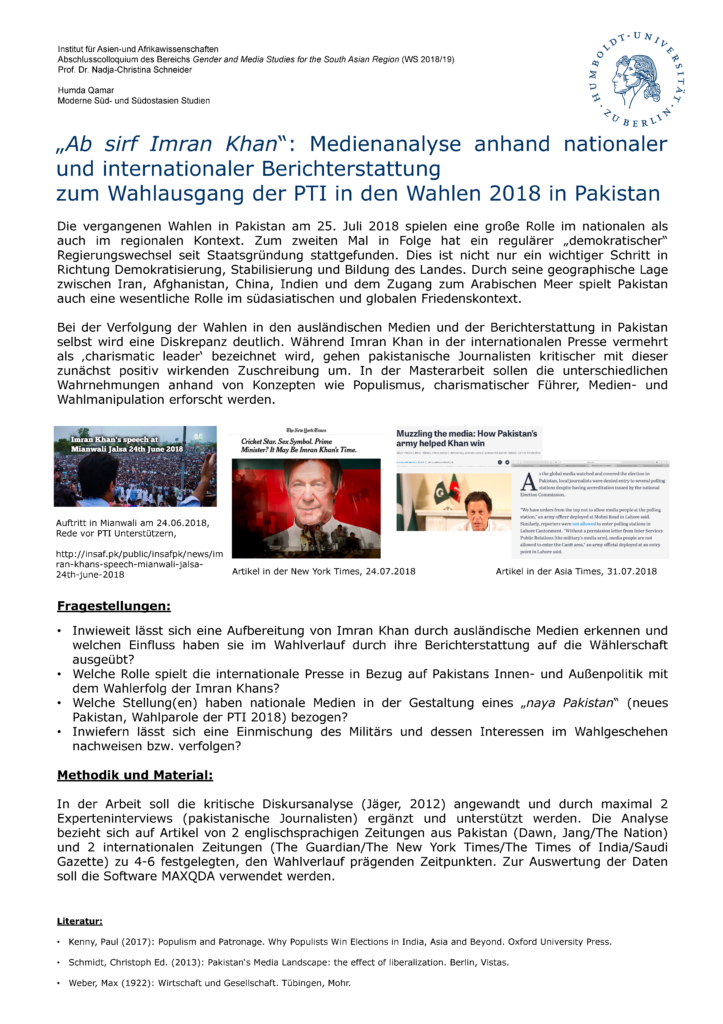
‚Parmigiano Punjabi‘ – Sikhs in Italien: Eine kritische Reflexion einer modernen Migrationsgeschichte
Lukas Hanraths
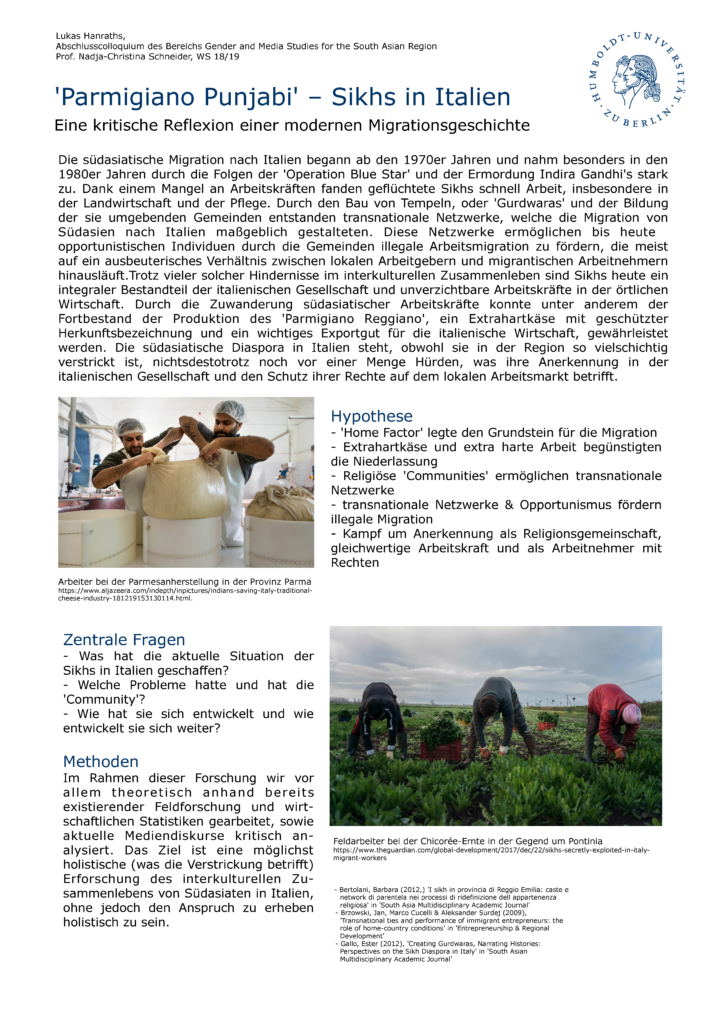
Sexuelle Belästigung im öffentlichen urbanen Raum in Kairo: Eine explorative Studie zu räumlicher Mobilität und Mobilitätswahrnehmung von ägyptischen Studentinnen
Rebecca Rohe
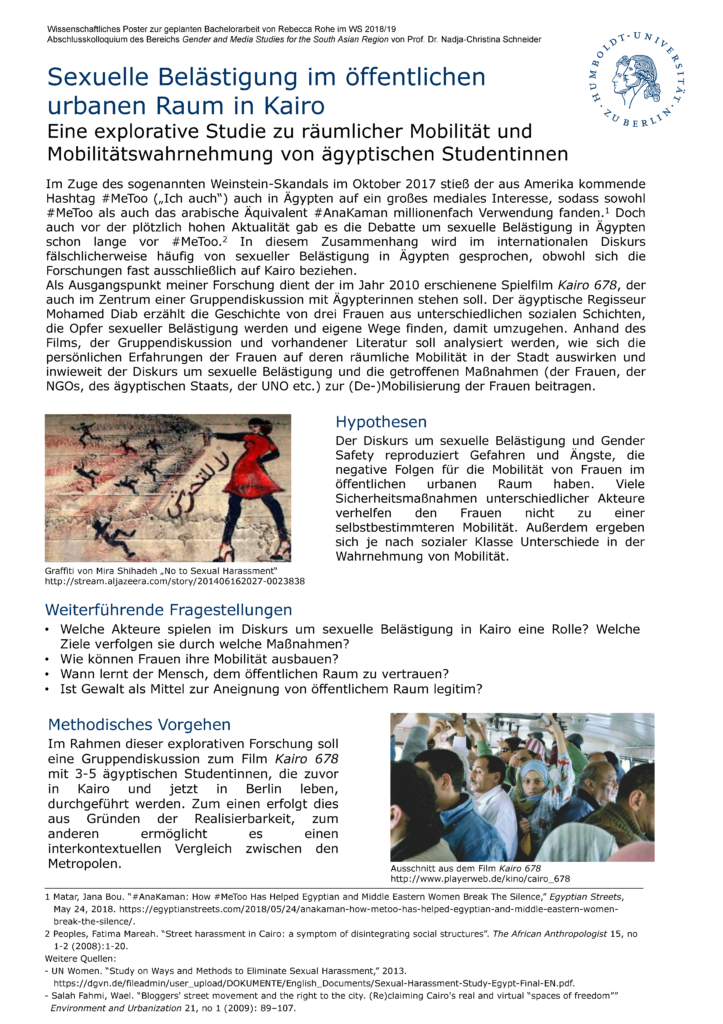
Studierendenaktivismus in Indien: Die JNU-Proteste seit 2016
Anna Schnieder-Krüger
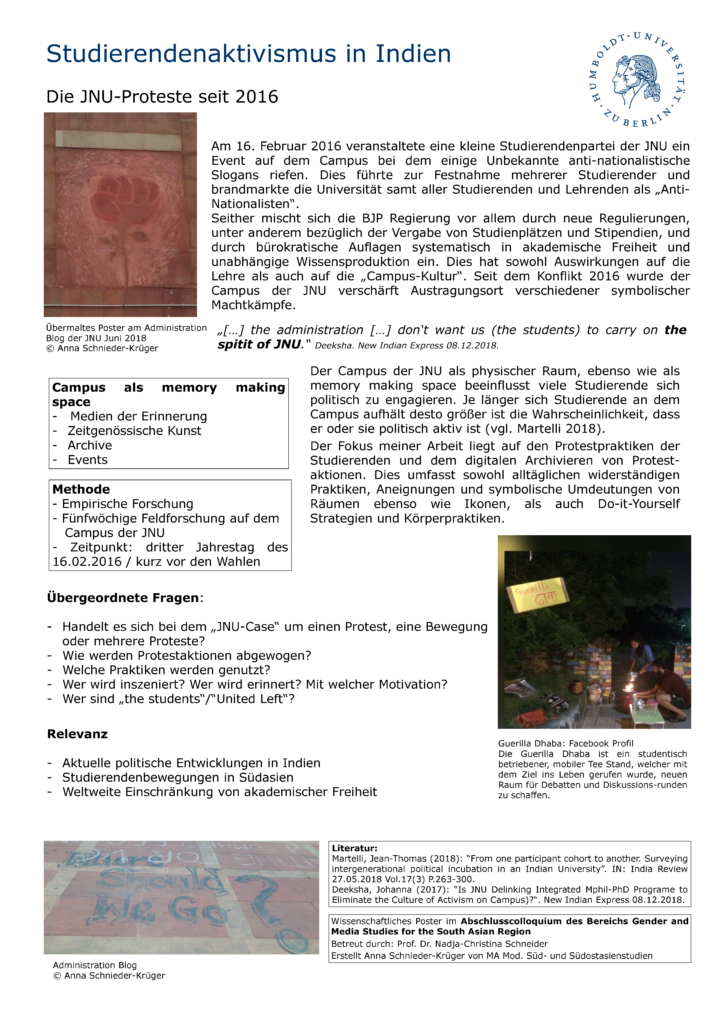
This research-oriented interdisciplinary seminar sought to critically examine historical as well as current perceptions and discourses about academics who, due to institutional, structural or political constraints, were forced to leave their home country and seek exile elsewhere. In contrast to well-known artists or authors, exiled academics are often at the margin of inquiries into their specific situation and self-positioning. The seminar therefore aimed at a deeper understanding of their specific situation and self-representation. Students formed three research teams and carried out their own empirical research explorations into these topics. They were advised by teacher tandems and had the opportunity to specialize in one of three focus areas:
Focus area 1: Academics and identities on the move? The role of (social) media in processes of identity construction (Co-supervisors: Prof. Dr. Özen Odağ, Touro College Berlin, and Dr. Olga Hünler, Universität Bremen)
Focus area 2: (Transnational) Networks in Exile – Topics, Discourses and Advocacy (Co-supervisors: Prof. Dr. Carola Richter, Freie Universität Berlin, and Dr. Amal El-Obeidi, Universität Bayreuth)
Focus area 3: Cities of academic exile and their translocal networks (Co-supervisors: Prof. Dr. Nadja-Christina Schneider, Humboldt-Universität zu Berlin, and Prof. Dr. Nil Mutluer, Humboldt-Universität zu Berlin)
Summary of Focus Area 1: Goals, research questions, and empirical studies
Participants:
Prof. Dr. Özen Odağ, Dr. Olga Selin Hünler (Supervisors)
Serra Bozdoğan, Klara Ronzheimer & Emma Tordoff (Students of Touro College Berlin)
Summary:
Focus area 1 explored the identity work that exile academics engage in and thus represented a psychological perspective of academics on the move.
Research Questions:
- How are exile academics represented in their home country (in terms of ascribed identities)?
- How do exile academics construct their identity in their new environment and adapt?
Our focus was on Barış için Akademisyenler (BAK) – Academics for Peace (see a detailed description of this group below).
Our research questions were addressed in three separate empirical studies.
Study one content analysed the representation of BAK Academics on Ekşi Sözlük, an alternative social media platform used by the general public in Turkey to express public opinion and discuss a large variety of socio-political trends in and outside of Turkey. The platform is the largest online community in Turkey, currently hosting more than 400.000 registered users.
Study two was a thematic analysis of the self-description of BAK-Academics on the BAK-Academics blog Gurbetteki Akademisyenler (GAK – Academics in the Foreign Land). This blog is used by Turkish academics in exile as an autobiographic space for self-expression. Blog entries touch on topics as various as identity, personal struggles, home, coping strategies, and emotions.
In Study 3 we interviewed five BAK academics currently residing in Germany with respect to their identity and adaptation in Germany (see interview guide below).
Our research design, questions, and specific studies including results are presented on separate posters assembled in Power-Point-Slides available for viewing in this blog:
Our theoretical background, research design, and specific studies are described in more detail on our PPT 1: Research design.
The results of Study 1 and Study 2 are presented in more detail on PPT 2: Social Media Analysis.
The results of our interview study (study 3) are presented in more detail on PPT 3: Interview Results.
Background info on ACADEMICS FOR PEACE – BARIŞ İÇİN AKADEMİSYENLER
Academics for Peace (AfP)[1] are the signatories of the petition “We will not be a party to this crime!” which was publicized in January 2016. The peace petition was condemning the Turkish government’s military operations in the mainly Kurdish populated Southeastern cities of Turkey, because of the tragic impacts on the civilians and calling for an end to violence in the region.
Since the declaration of the petition, AfP faced numerous violations. Hundreds of the signatories were fired from their jobs or forced to resign or retire, they were removed and banned from public service with the decree laws, their passports have been cancelled, several were physically and verbally threatened, and four of them were imprisoned. The AfP are facing the penal proceedings in assize courts with the accusation of “Making Propaganda for a Terrorist Organisation” based on the Article 7/2 of the Turkish Anti-Terror Act and the Article 53 of the Turkish Penal Code.
Despite all defamations, threats and harassment, AfP manage to resist to repressions and collectively support each other. AfP have received several letters of support from international academic organizations, including MENSA, APA, IAFFE, ASA as well as messages of solidarity from internationally recognized academics, including Eric Fassin, Steven Pinker, Noam Chomsky, Judith Butler and many more.
AfP received the 2018 Courage to Think Defender Award, for their extraordinary efforts in building academic solidarity and in promoting the principles of academic freedom, freedom of inquiry, and the peaceful exchange of ideas. AfP were also awarded with the Aachen Peace Prize, the Academic Freedom Award of the Middle East Studies Association of North America, as well as the 8. Johann-Philipp-Palm-Preis, and some more.
The signatories of the peace petition reside in different geographies, they teach, conduct research, publish their work, but also continue to spread the message of a peaceful resolution of conflicts. They promote the ideas of academic freedom and the values of university world-wide and strive to support each other by all means.
Academics for Peace Germany (AfP-Germany)[2]
The association was founded in Germany on October
2017 by the signatory academics and the colleagues who supported the values of
academic freedom and freedom of speech. AfP-Germany organizes campaigns for the
solidarity with peace academics and raises awareness and support with
colleagues who have been threatened, targeted, lost their job, and banned from
working in public service. Our aim is to function as an international “hub” for
human rights organizations, NGOs, academics, as well as international press
seeking information on the repression against Academics for Peace in Turkey.
TOPICS and INTERVIEW GUIDE – STUDY 3
- Topic 1: Experience
O’Keeffe,P., Pásztor, Z. (2016). Syrian Academics in Exile, in New Research Voices
Pierigh, F (2017) Changing the Narrative: Media Representation of Refugees and Migrants in Europe, published by World Association for Christian Communication – Europe Region
- Topic 2: Acculturation & Adaptation
Mesquita, B., Leersnyder, J., & Jasini, A. (2017). The Cultural Psychology of Acculturation, in The Handbook of Cultural Psychology
Liebkind, K. (2006). Ethnic identity and acculturation. In The Cambridge handbook of acculturation psychology
- Topic 3: Self & Identity
Vignoles, V., Schwartz, S. & Luyckx, K. (2011) Towards an Integrative View of Identity, in Handbook of Identity Theory and Research
Bhugra, D.,
& Becker, M. A. (2005). Migration,
cultural bereavement and cultural identity. World psychiatry : official
journal of the World Psychiatric Association
For the detailed interview guide, please click here.
[1] https://barisicinakademisyenler.net/node/314
[2] https://academicsforpeace-germany.org/
Academics and Identities on the Move: Exploring Processes of Identity Construction – Research Design
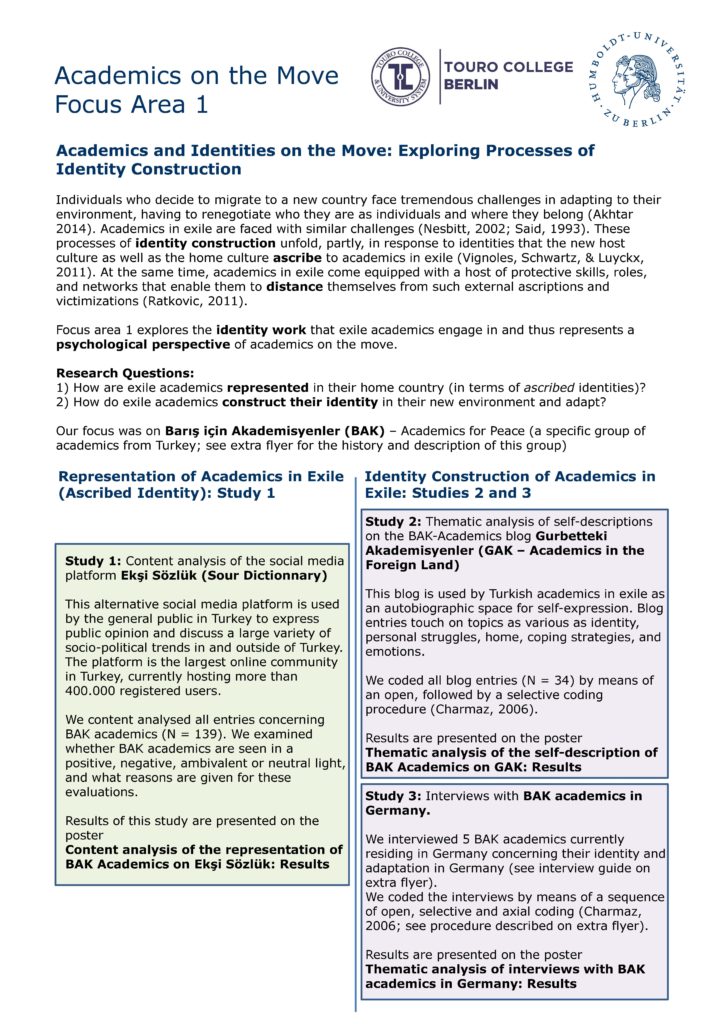
Academics and Identities on the Move: Exploring Processes of Identity Construction – Social Media Analysis
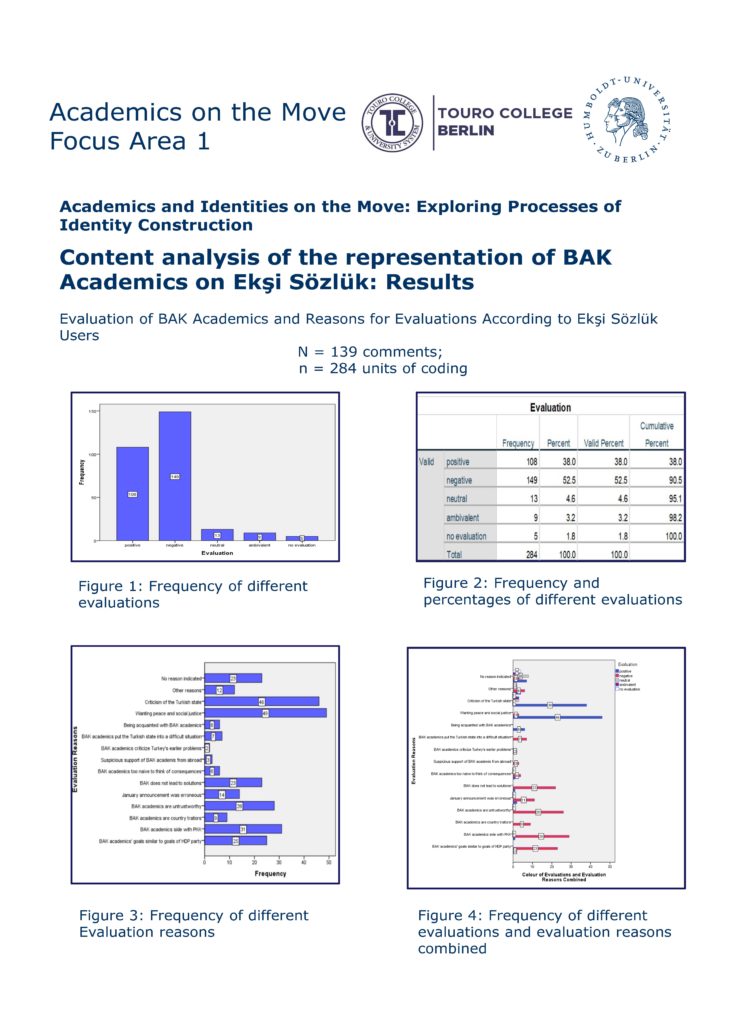
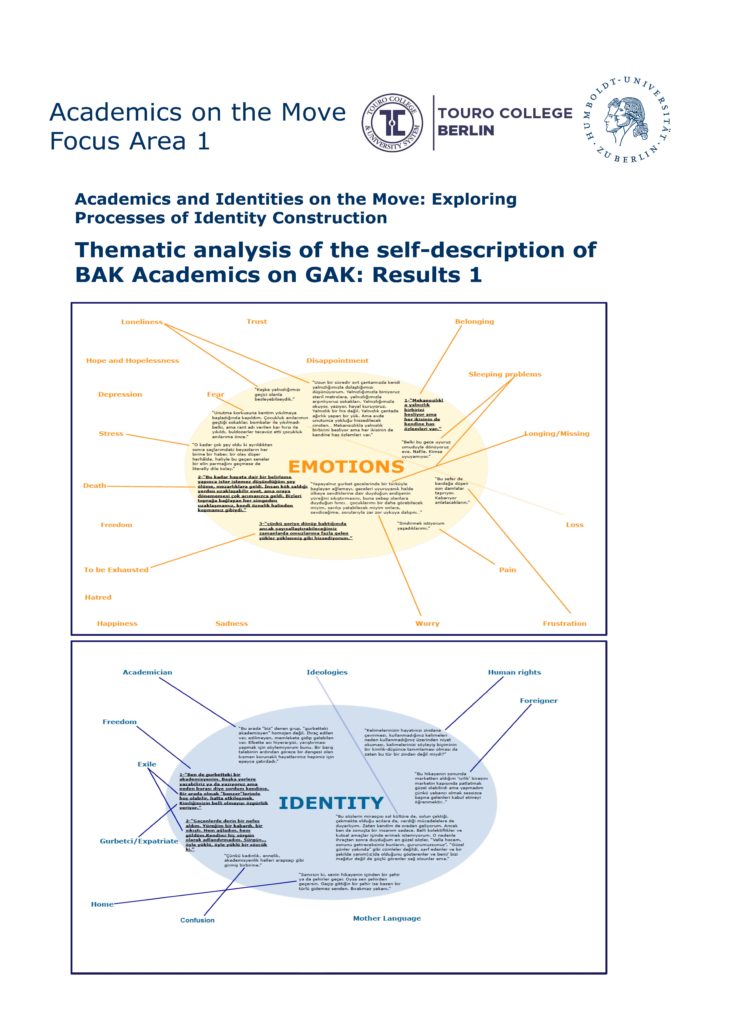
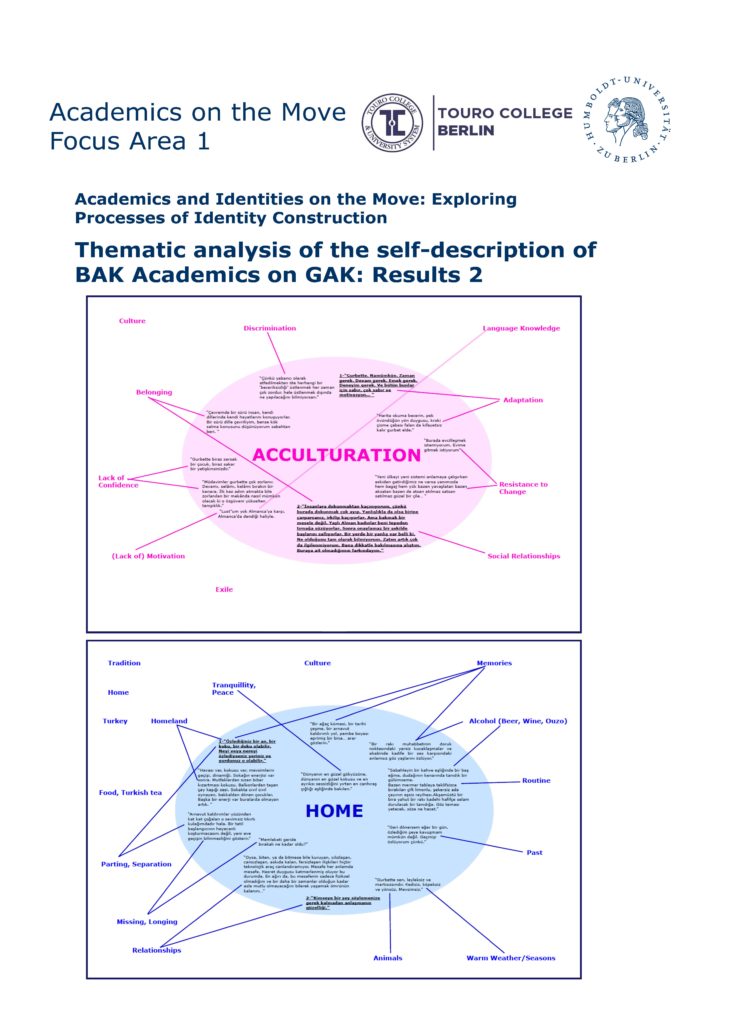
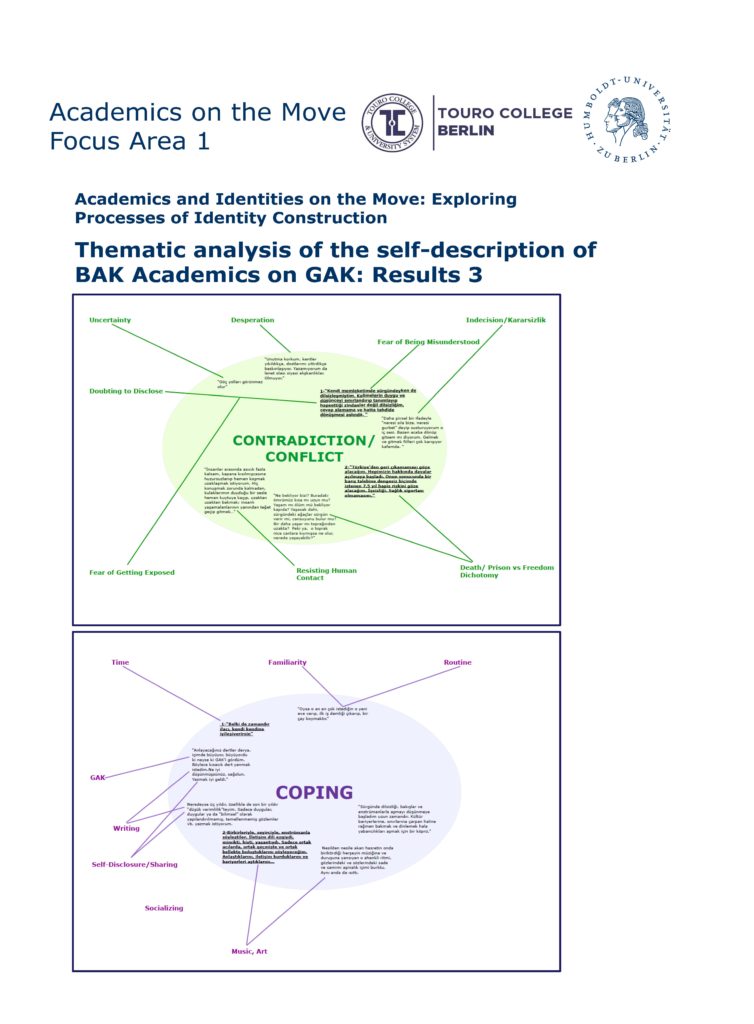
Academics and Identities on the Move: Exploring Processes of Identity Construction – Analysis of Interviews
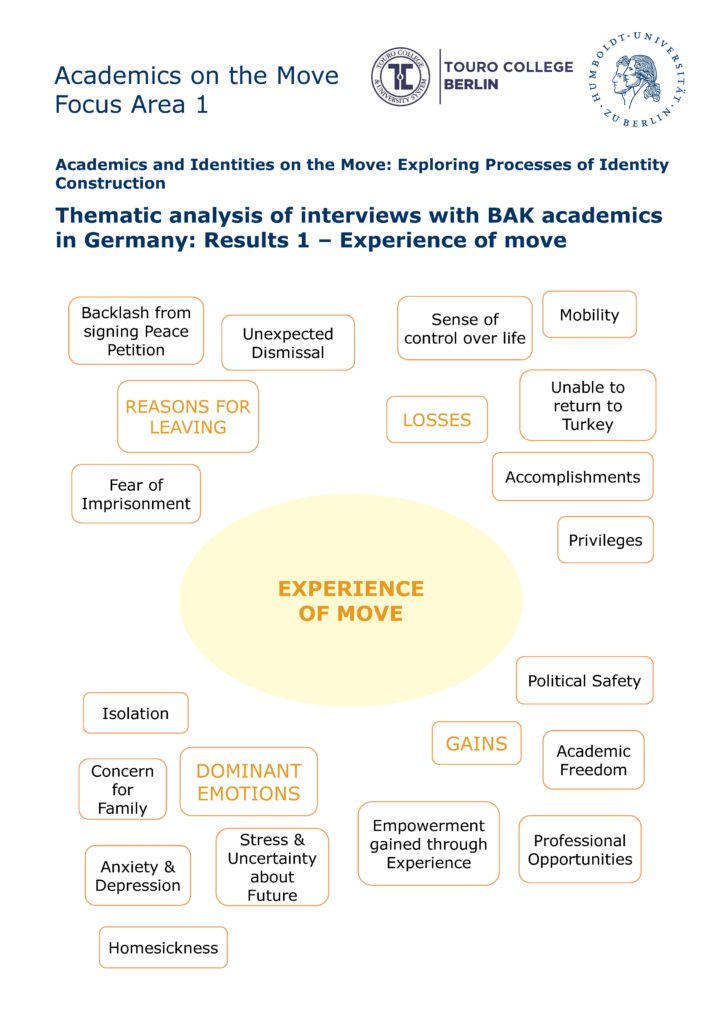
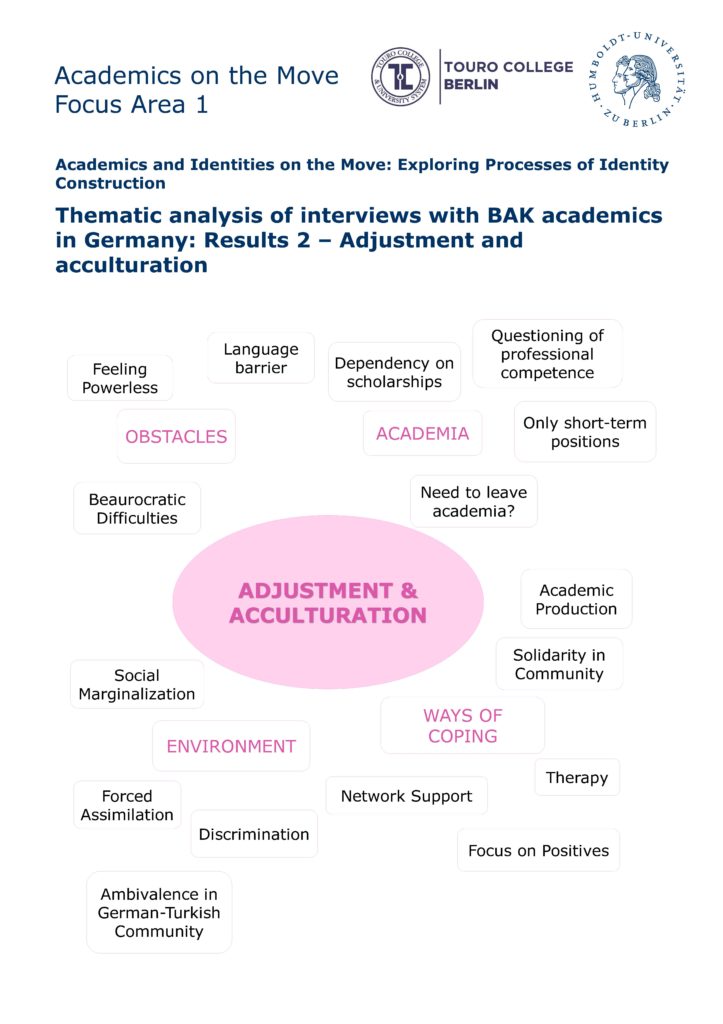
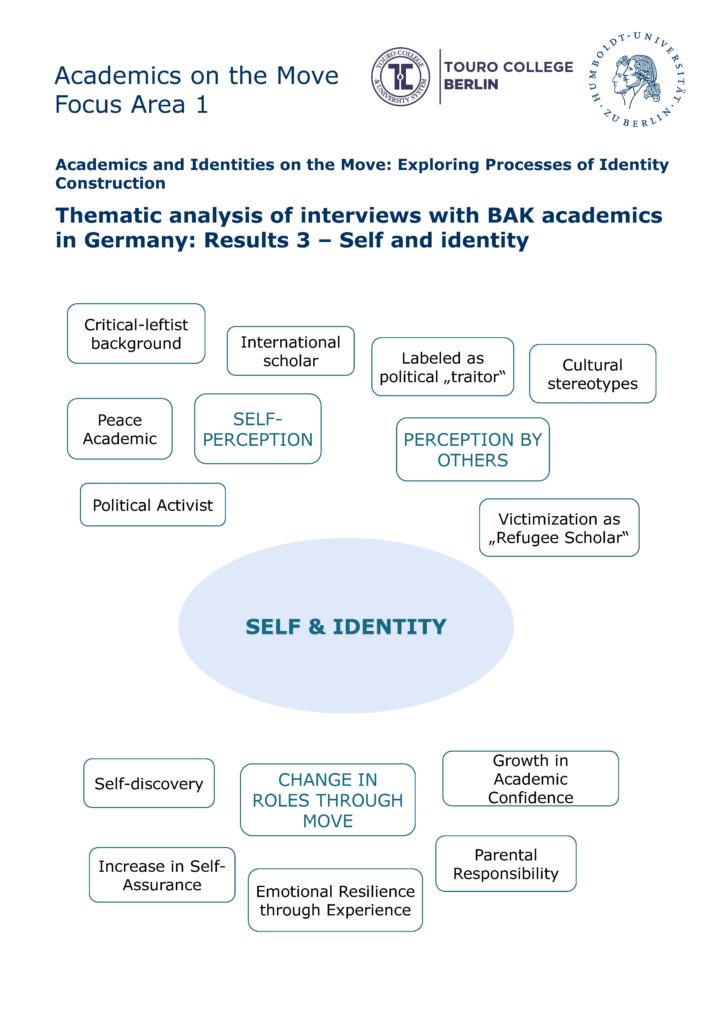
This research-oriented interdisciplinary seminar sought to critically examine historical as well as current perceptions and discourses about academics who, due to institutional, structural or political constraints, were forced to leave their home country and seek exile elsewhere. In contrast to well-known artists or authors, exiled academics are often at the margin of inquiries into their specific situation and self-positioning. The seminar therefore aimed at a deeper understanding of their specific situation and self-representation. Students formed three research teams and carried out their own empirical research explorations into these topics. They were advised by teacher tandems and had the opportunity to specialize in one of three focus areas:
Focus area 1: Academics and identities on the move? The role of (social) media in processes of identity construction (Co-supervisors: Prof. Dr. Özen Odağ, Touro College Berlin, and Dr. Olga Hünler, Universität Bremen)
Focus area 2: (Transnational) Networks in Exile – Topics, Discourses and Advocacy (Co-supervisors: Prof. Dr. Carola Richter, Freie Universität Berlin, and Dr. Amal El-Obeidi, Universität Bayreuth)
Focus area 3: Cities of academic exile and their translocal networks (Co-supervisors: Prof. Dr. Nadja-Christina Schneider, Humboldt-Universität zu Berlin, and Prof. Dr. Nil Mutluer, Humboldt-Universität zu Berlin)
Focus Area 3
Musealizing Exile: Memory-making, Narration and Epistemological Order in Museums on Exile History
As a participant in the research seminar “Academics on the Move: Notions of Exile, Re-Migration and Translocal Solidarity” I decided to conduct research on musealization practices of exile and of exiles in Berlin. I want to understand how institutions conceptualize and engage with exile. The projects rests on especially two assumptions: museums and archives have an important influence on the extent of a society´s historic awareness because they have to select what they add to their archival holdings or what they decide to display. On the other hand, they might also be influenced by political issues and public debates, for example by receiving project-based funding or by demands for different stories to display. It is, however then, up to the institutions and individuals how aware they are of their responsibilities. Therefore, my aim is not to conduct research on historic exile. Instead, I aim at an understanding in second observation of representational practices. I ask how knowledge on exile is constructed in museums and which phenomena, historical and current, are labelled as exile. I am especially interested whether institutions share a common approach or even a common concept in order to present a history of exile that is more complete.
I decided to approach the topic by conducting conversations with representatives of different institutions which deal with current or historic forms of exile. The choice of institutions ranges from museums, i.e. the Jewish Museum Berlin, to foundations like the Stiftung Exilmuseum to scholarship foundations like the Alexander von Humboldt-Stiftung which awards the Philipp Schwartz-Scholarship to selected threatened foreign researchers. I chose to talk to institutions of various organizational structure and purpose because each of them engages with the topic and, therefore, has presumably a concept on how to define exile; and, more interesting even, who is not counted as exile. Furthermore, the discussion with the foundation helps me to understand what is perceived as a defining factor of academic exile. The methodology for the research is, thus, mainly based on conversations with exiles while also partially drawing from visual anthropology.
Some preliminary findings were presented at a multimedia exhibition in Touro College in December 2018. The poster at the exhibition focused mainly on two questions: Which space is devised to exiles and exilic history in museums in Berlin? Which gaps and silences are produced within exilic history?
My engagement with the topic since December lead to some new questions and establishment of contact with new institutions. Through the prolonged engagement I became more aware of existing cooperation and collaborations between institutions. My research focus has, however, slightly shifted after conducting several conversations. Instead of only criticizing a gap of awareness in exilic history (mainly, the time between 1950 to 2016), I look at current representations in exhibitions. This means that I observe in exhibitions and in the conversations in which roles exiles are perceived. Are exiles framed as victims? Are current exiles displayed but with the images of historic exiles in head? Does the display rely on a specific knowledge of the visitors? How do museums choose exemplary persons through whose biography they attempt to tell a history of exile? The research project has continuously been gripping for me. It is an interesting experience to learn more about the institutional frameworks and self-critical reflections on current museal practices.
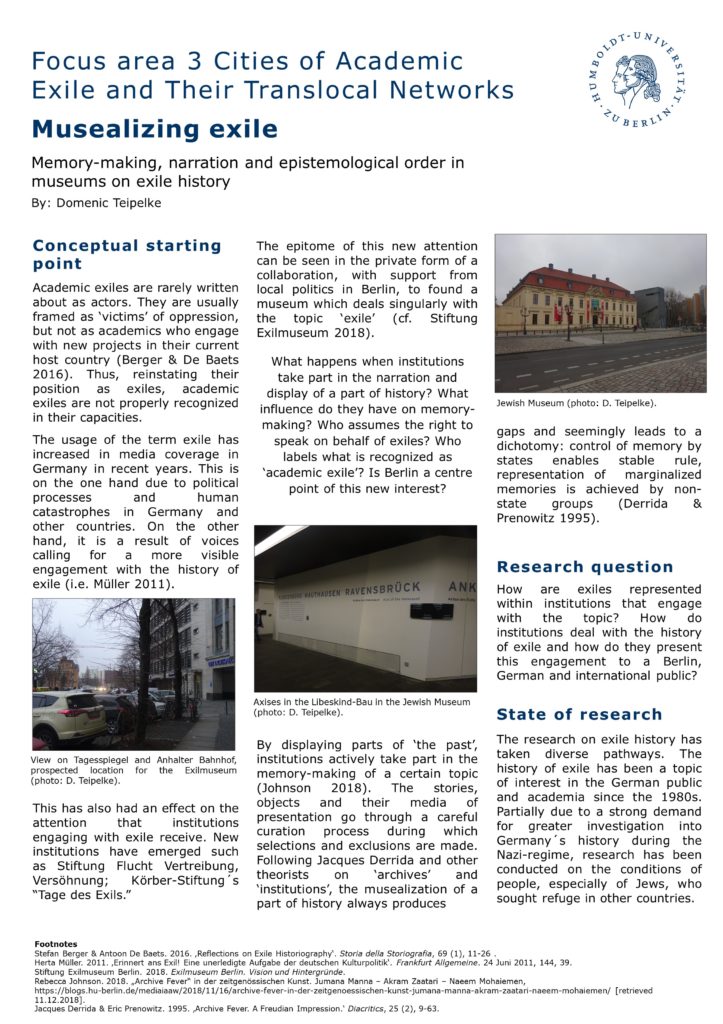
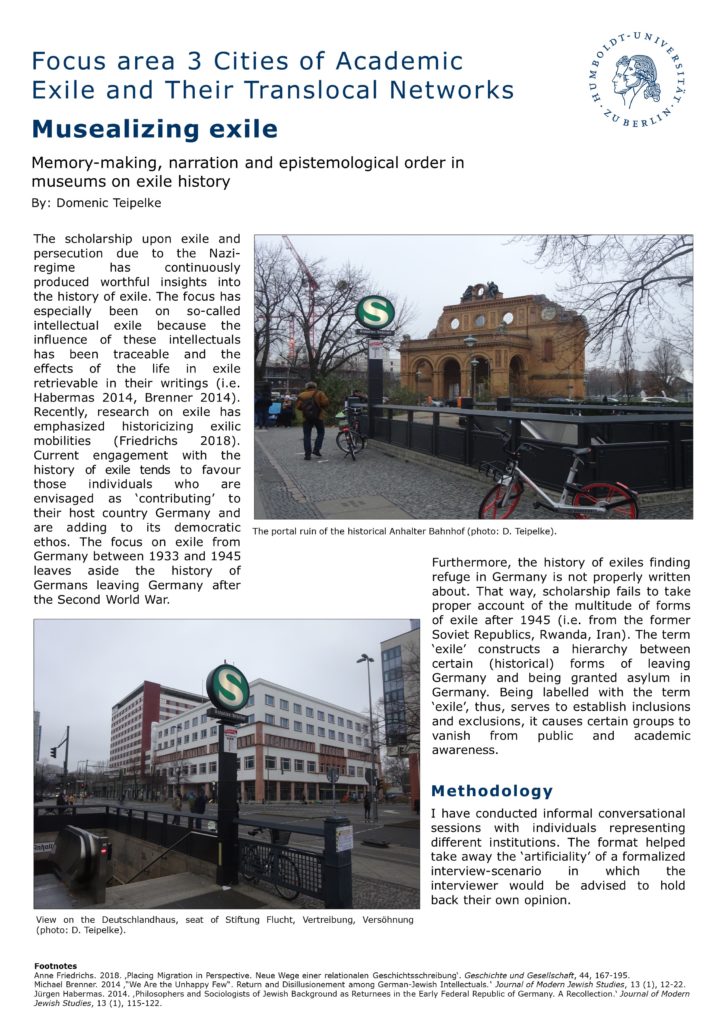
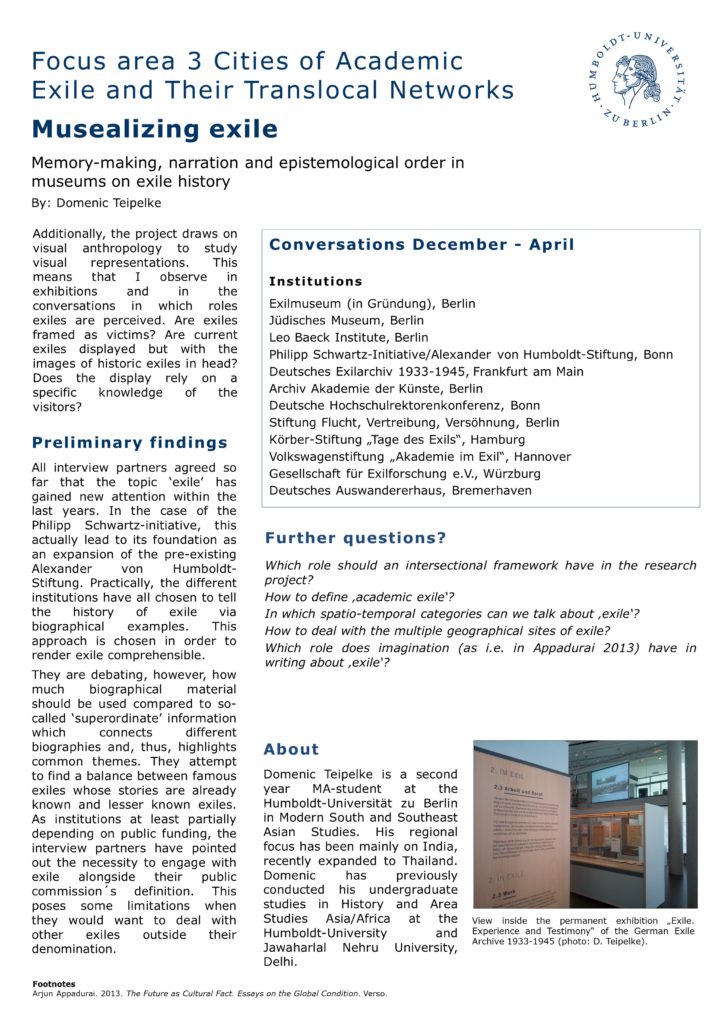
Cities of Academic Exile and Their Translocal Networks
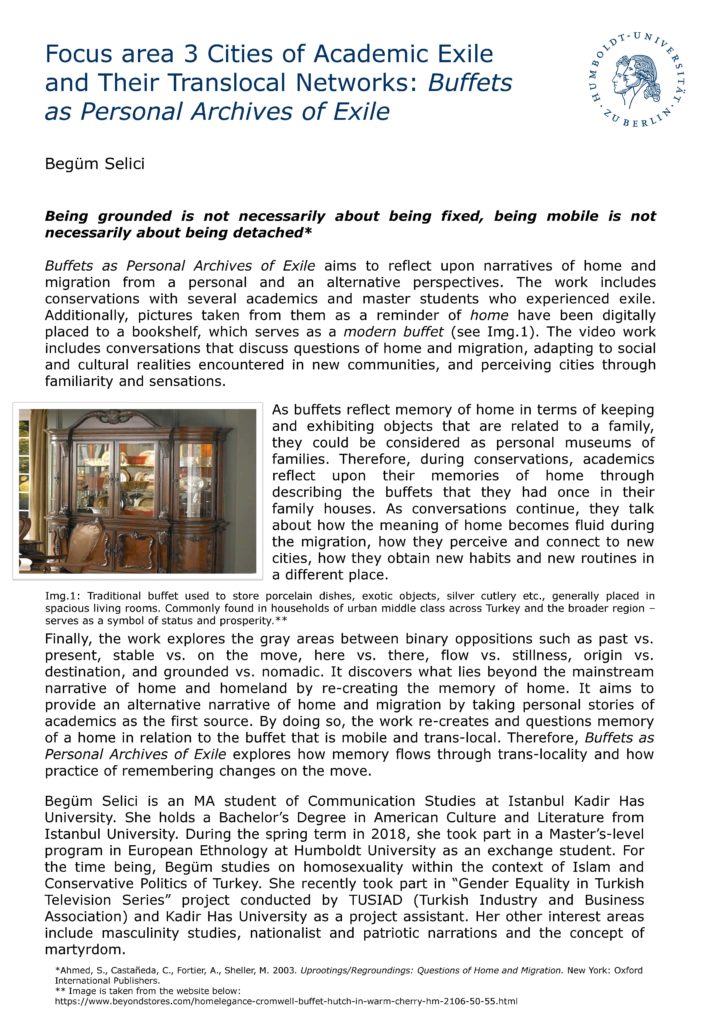
This research-oriented interdisciplinary seminar sought to critically examine historical as well as current perceptions and discourses about academics who, due to institutional, structural or political constraints, were forced to leave their home country and seek exile elsewhere. In contrast to well-known artists or authors, exiled academics are often at the margin of inquiries into their specific situation and self-positioning. The seminar therefore aimed at a deeper understanding of their specific situation and self-representation. Students formed three research teams and carried out their own empirical research explorations into these topics. They were advised by teacher tandems and had the opportunity to specialize in one of three focus areas:
Focus area 1: Academics and identities on the move? The role of (social) media in processes of identity construction (Co-supervisors: Prof. Dr. Özen Odağ, Touro College Berlin, and Dr. Olga Hünler, Universität Bremen)
Focus area 2: (Transnational) Networks in Exile – Topics, Discourses and Advocacy (Co-supervisors: Prof. Dr. Carola Richter, Freie Universität Berlin, and Dr. Amal El-Obeidi, Universität Bayreuth)
Focus area 3: Cities of academic exile and their translocal networks (Co-supervisors: Prof. Dr. Nadja-Christina Schneider, Humboldt-Universität zu Berlin, and Prof. Dr. Nil Mutluer, Humboldt-Universität zu Berlin)
Focus Area 2
Academics on the Move: (Transnational) Networks of Academics in Exile
Due to their mobility, academics are considered important bridges for the transfer of knowledge from and into the scientific communities of the countries they work in. There are often close personal contacts and institutional affiliations that should facilitate information flows across national borders. However, involuntary mobility because of political or security reasons may hamper this transnational bridging.
Our team wanted to investigate how professional networks of scholars in exile look like and which key persons and institutions are considered to be important for their academic career. Furthermore, we wanted to find out how frequently and through which channels scholars in exile communicate with their peers.
The research team consisted of
– Heaven-Leigh Carey (Touro College Berlin)
– Mohamed Amer Fadhil (Humboldt-Universität zu Berlin)
– Ben Schroeder (Touro College Berlin)
– Dr. Amal El-Obeidi (Garyounis University Benghazi & University of Bayreuth)
– Prof. Dr. Carola Richter (Freie Universität Berlin)
Methodological approach: Qualitative network analysis
With a qualitative network analysis, we explored the networks of 3 different scholars in exile. They had different backgrounds with regard to their country of origin, academic discipline, and career status.
We reconstructed their particular network through a so-called ego-centric network mapping. This means that in a longish interview we asked the person to indicate institutions or individual persons who are important for their professional career. To collect them, the interviewee put the names on a list. It was not necessary to mention names, but only initials or functional characteristics were important for us (i.e., think tank, supervisor, etc.). Then we asked the person to arrange these names according to the perceived importance in an ego-centric network map and to explain in more detail the relationship to this “node” and the kind and frequency of communication (think-out-loud-technique). In order to find out more about the transnationality of the network, we distinguished in the network map three geographical areas: host country (= Germany), home country and the transnational area.
Due to the nature of the interview (face-to-face interview necessary), the selection of interview partners was limited to Berlin. Initially, we only wanted to focus on politically active scholars but realized soon that this was a too limiting category. Therefore, we aimed for including people with different backgrounds to gain a variety of possible networks.
As a result, we will present three animated network maps of the three interviewees. The names of the interviewees are all pseudonyms, the nodes have been anonymized. You will find below more general information on the respective country and the situation for scholars there as well as some background information on the interviewed scholar. Then you can explore the networks of the respective scholar by navigating through the animated map and listen to the description of the relation to the nodes.
Conclusion
In our research and interviews with our academics of interest, we uncovered striking similarities in their experiences as academics who have been displaced in various ways. Though the academics come from a variety of backgrounds, disciplines, and stages in their careers, their shared difficulties and encounters with transnational academic settings illuminate the ways academic exiles, refugees, and migrants navigate the often uncertain terrain of academia. Common themes that surfaced in our interviews included an emphasis on the importance of strong institutional ties in one’s host country and a tendency to feel as if one leads a fragmented life, split between nations and cultures. Some academics faced more distinctive experiences such as coming up against disciplinary boundaries or having to navigate a turbulent political landscape without their voices being co-opted.
Network 1
Context Iran: Political developments and situation for scholars
In 1946 British and Soviet forces withdrew from Iran, allowing a period of independent development of the country. But already in 1953 Prime Minister Mohammad Mossaddegh was overthrown by a coup backed by US and UK intelligence forces and Shah Mohammad Reza Pahlavi was re-instated from exile. In 1979, the Shah’s authoritarian rule and controversial policies led to mass demonstrations and strikes, sparking the Iranian Revolution. In April 1979 an Islamic Republic of Iran is proclaimed. A Cultural Revolution began and a period of purges of academia ensued in efforts to remove Western, non-Islamic, and leftist influences in universities. In the era of so-called reformist president Khatami in 1999 mass demonstrations in Tehran by students resulted in the arrest of more than 1,000 students. In 2009 conservative president Mahmoud Ahmadinejad’s electoral victory was challenged as fraudulent, leading to large protests and a subsequent crackdown from the state, resulting in more than 30 deaths. This was called the Green movement. In 2017-18 again a series of public protests broke out across Iran in opposition to economic policies as well as the theocratic regime.
Since the Cultural Revolution period of the 1980s, academic freedom in Iran has had a troubled history. The Supreme Council of the Cultural Revolution is the political body that oversees and monitors academic activities to ensure they align with the Islamic Republic’s founding values. In the 1980s and 1990s, this meant sweeping actions such as closing universities, violence on campuses, mass bans on books, and purging of thousands of students and professors. In more recent times, as recent as 2005, widespread dismissals of university faculty have occurred, along with the incarceration of students who have voiced criticism of the state and its policies. The Supreme Council supervises the selection of applicants to universities and is involved in organizing the structure of academic institutions, making it exceedingly dangerous to express dissent or hold views that might be perceived as oppositional to the regime.
Meet Ali from Iran
Ali is an academic in his 50s from Iran who has lived and worked in Berlin for three years. In Iran he studied within the field of natural sciences, eventually becoming a scholar, including a PhD, in his chosen discipline. Despite a productive career including authorship of numerous studies and several books, Ali was forced to flee Iran due to political reasons, initially landing in Copenhagen, Denmark. After a few years there, Ali made way to Germany and eventually ended up in Berlin.
When Ali first came to Germany, he didn’t know how to reassemble the career he was forced to suspend. Upon fleeing Iran, Ali’s entire professional life had to be put on hold; and in Germany, he would need to start again. Thoroughly cut off from his previous academic associations in Iran, Ali needed to effectively start from scratch to come into contact with and construct a new network. Ali was able to begin the process of rebuilding his career in Berlin after meeting and befriending a local professor who became something of a mentor to him. Rather rapidly, Ali managed to find work as a researcher at a university institute in Berlin. Although he quickly found a position, in large part due to his prior scientific capital, Ali faced initial challenges such as adapting to working in English and becoming acquainted with the German university structure. Despite the early difficulties and his nascent network’s primary reliance on a single key contact, Ali reports that the hurdles to engaging with the academic sphere relevant to his work in Berlin have largely been overcome.
A problem Ali faces is the inability in Germany to take his career in a new direction. Ali has had a passion for the social sciences since he was a student and would like to pursue a career transition, but has encountered unyielding obstacles. He wants to study and complete a PhD in his discipline of interest and has prior experience with it, but has come up against Germany’s stringent rules on prerequisites for university programs, which would require him to first complete a Bachelor’s degree, a Master’s degree, and then finally he could pursue a PhD. The rigidity of the university degree track leaves Ali with few choices concerning his pursuit of his passion, but he continues to explore his options to find a way to realize his aspiration.
Check out Ali’s network here: (to view it best, please enable Adobe Flash or a Prezi Viewer App)
Network 2
Context Syria: Political developments and situation for scholars
Syria as a nation-state was founded under the French mandate at the beginning of the 20th century. Uprisings for independence shook up the region until 1943 when the first President was elected.
In 1963 Baathist army officers seized power and in November 1970 Hafez al-Assad overthrew the Syrian president and ruled the country with an authoritarian fist for decades. After his death in 2000, al-Assad was succeeded by his second son, Bashar.
After four years of Bashar’s Regime, the US imposed economic sanctions on Syria. This was accompanied by many protests that escalated when in March 2011 security forces shot protestors. This triggered violent unrest that steadily spread nationwide over the following months. Al-Assad sent in troops to restore order at the cost of people’s lives. Until 2018, several militias established themselves in Syria, in changing alliances with international support. In mid-2014 the so-called “Islamic State of Iraq and Syria” (ISIS) declared a „caliphate“ in parts of Syria. In the following years Russia carried out air strikes in Syria, Turkish troops crossed Syrian borders, and the US ordered series of missile attacks.
The unrest, the external intervention, the Islamic State’s threat and the regime’s oppression caused hundreds of thousands of Syrians to flee the country to Turkey, to Lebanon, or to Jordan – but also to cross the sea seeking asylum in Europe.
Academic life was highly affected by the troubled and insecure situation in Syria since 2011: universities, academics, and students have increasingly been targets of censorship, state interference and political violence from different actors. Academics were subject to intimidation, violence, disappearances, imprisonment and even torture and killings. Therefore, the war in Syria displaced at least 2,000 scholars until 2017.
Meet Tarek from Syria
Tarek is a humanities‘ student in his late 20s from northern Syria. He already started his Ph.D. at a prestigious Syrian university, when he had to pause it due to insufficient resources and problems of movement in Syria. Indeed, the troubled situation put him at a distance from his academic work. Since his studies were in limbo, and in order to escape mandatory army service, he decided to go to Turkey in 2014.
However, he was faced with a dilemma in the area in which he first stayed in Turkey: in order to find work he would need to learn Turkish, and to learn the language he was in dire need to find a job that would have helped pay the language course – a vicious circle! This situation forced him to go to Istanbul where he started teaching Arabic for Syrian students at secondary school both morning and evening sessions. This set his ambitions to pursue a Ph.D. on complete hold. His academic career could not be continued in Turkey.
By the end of 2015, he still had no job at a university and couldn’t manage to get into academia, so he decided to flee to Europe across the sea as so many did during this time. Since arriving in Germany in October 2015, he was dedicated in learning the language and finished C1 level, and also managed to get an internship at a prestigious academic institution in his subject. However, this did not give him a kick-start into academia: his first Ph.D. application to a German university was rejected. Currently, he is waiting for a reply to another application.
Check out Tarek’s network here (to view it best, please enable Adobe Flash or a Prezi Viewer App)
Network 3
Context Egypt: Political developments and situation for scholars
In January 2011, activists began an uprising in protest of poverty, corruption, and the three-decades-long rule of president Hosni Mubarak – who finally stepped down in February. Although the military was still in control, the country faced an unprecedented upswing in political pluralism.
In November 2011, parliamentary elections ousted military rule and two Islamist parties, The Muslim Brotherhood and Nour Party, won a majority of seats. In addition, in June 2012 the Muslim Brotherhood’s candidate Mohamed Morsi became Egypt’s first freely elected president. During the year after this election, the country became extremely polarized. This culminated in June 2013 when a rebellion demanded president Morsi step down. Millions of protesters gathered again in Tahrir Square. After a few days, army Chief General Sisi suspended the constitution and detained president Morsi. The military assumed control once again. Protests continued to escalate, and clashes between opposing groups, and activists and the police, became bloody and violent. Since then, Egypt has been ruled by Sisi in an authoritarian manner, outlawing and arresting activists and former politicians.
In addition, students and academics in Egypt have been subject to censorship and crackdowns. The government has taken steps to exert more control over universities, including arresting and expelling students and faculty members, as well as hand picking the deans and presidents. Between 2013 and 2016, there have been 2,138 violations of students’ rights, including 21 killings.
Meet Rana from Egypt
Rana is a scholar in her early 30s from Egypt. After earning her bachelor’s degree in her home country, she traveled to Europe to get her master’s degree. Working as a women’s rights activist in Egypt after her graduation during the early years after the uprisings, she could not stand staying in Egypt any longer after the military had taken over again in 2013 and academic, as well as political freedom in general, decreased. She looked for jobs abroad and now resides in Germany where she is finishing her PhD in the social sciences. Despite her distance, she continues to do field work in Egypt for her research and maintains essential and robust connections in her home country.
Although she is a person that could be considered a modern cosmopolite and mobile scholar, she cannot get rid of the feeling of “in-betweenness.”
Each time she travels back to Egypt, she wonders if this will be the time she isn’t able to make it in or out of the country. The looming fear of detainment is present throughout her trip, and it doesn’t end when she comes back to Germany. Indeed, she thinks of the same things even in her host country, wondering how she will be greeted at the airport as she flies in from Egypt. Even on the street removed from her work, Rana worries about her status. As someone who does not look European or speak German, she is seen as an obvious outsider.
Check out Rana’s network here: (to view it best, please enable Adobe Flash or a Prezi Viewer App)
Links for reference:
https://www.britannica.com/place/Iran/The-Islamic-republic#ref230080
http://www.iranchamber.com/history/islamic_revolution/islamic_revolution.php
https://www.bbc.com/news/world-middle-east-14542438
https://www.aljazeera.com/news/middleeast/2011/01/201112515334871490.html
https://www.brandeis.edu/crown/publications/meb/MEB102.pdf
You can find the website for the Research Seminar „Academics on the Move: Notions of Exile, Re-Migration and Translocal Solidarity“ here.



